Sarah Chorn's Blog, page 15
November 20, 2020
Indie Author Interview | Andy Peloquin
This is part of a new series of interviews featuring indie authors. These interviews will drop once or twice a week. If you’d like to be part of this series, please contact me at Sarah (at) bookwormblues (dot) net. Please support the authors by clicking on the affiliate links in the interview, spread the word, and, of course, buy their books.
We’re all in this together, you know?
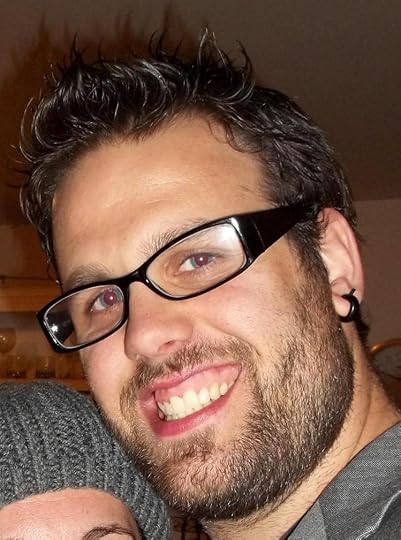
I am, first and foremost, a storyteller and an artist–words are my palette. Fantasy and science fiction are my genres of choice, and I love to explore the darker side of human nature through the filter of heroes, villains, and everything in between.
Speculative fiction provide us with an escape, a way to forget about our mundane problems and step into worlds where anything is possible. It transcends age, gender, religion,race, or lifestyle–it is our way of believing what cannot be, delving into the unknowable, and discovering hidden truths about ourselves and our world in a brand new way. Fiction at its very best!
Links
I’m also the creator of and player on Deranged and Questing: The Necromancer’s Idiot Apprentice, a weekly live D&D show that airs on Twitch.
Essentially, it’s just four players (and a weekly guest player) loving everything that makes D&D awesome, while sort of keeping to a cohesive storyline that I and the DM are creating.
Describe yourself in six words or fewer.
Giant, friendly, optimistic, laidback, nerdy, intelligent
Tell me about your book.
The Silent Champions series—starting with Shields in Shadow—is basically a fantasy version of a modern special forces team. A small group of warriors handpicked for their specific skills is brought together to try a new approach to a war that has been close to stalled for nearly a decade. The unique mix of character types and the secretive nature of their missions is what I loved about series like Tom Clancy’s Rainbow Six, and I have so much fun playing with it in a fantasy setting.
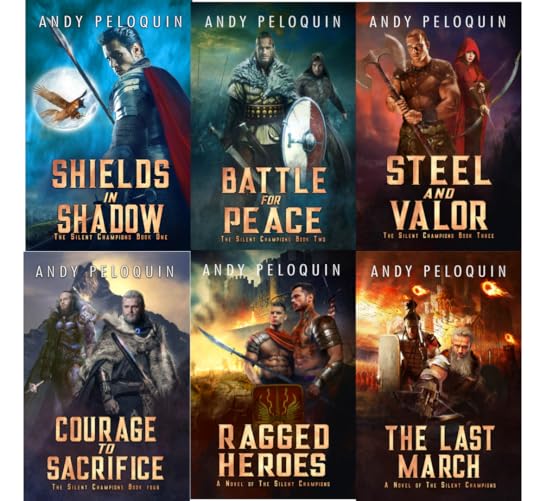
What makes you and your books unique? Shine for me, you diamond.
I’d like to say the genuine humanity of my characters and their struggles. Don’t get me wrong, I can write an epic battle scene, vicious plot twist, and gut-wrenching loss. But what really makes me love writing is being able to dive into the heads of people who are both so unlike me yet share so many similarities with my life, my dreams, my desires, and my challenges. Being able to learn about totally new people in a way I’d never be able to anywhere else allows me to showcase them—and the real-life people like them—to share the insights I’ve learned with others.
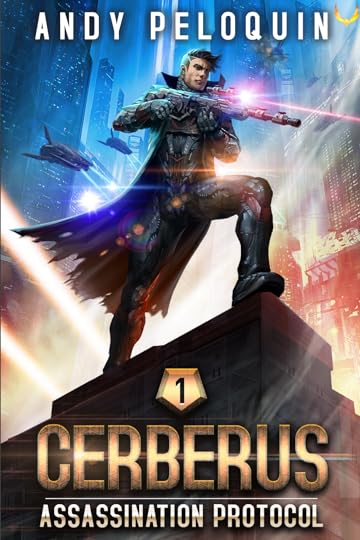
What are you working on now/any future projects you want to talk about?
I’ll be completing the 12th and final book of my military sci-fi/cyberpunk/space opera series, Cerberus, very soon, which will free me up to resume work on the last seven books (and second story arc) in my Hero of Darkness series. After that, I’ve got no idea what I’m going to write next, and that’s actually kind of exciting!
Let’s celebrate. What’s one of the best things that’s happened to you as an author? Don’t be shy.
I won a RONE Award in 2018 for a novel I never expected to win. I’ve gotten to attend various Comic Cons and have the time of my life. I’m a member of some of the best writing groups/collectives anywhere on the internet. And I’m married to the most wonderful woman in the world. All in all, a life worth celebrating!
Let’s talk about CRAFT
What about self-publishing appeals to you? Why did you choose this particular path to publication?
I work hard and type fast (around 90 WPM), so I end up finishing a book (80-120K words) in about 4-6 weeks. Having to sit around and wait months for a publisher to roll out my books once or twice a year was immensely frustrating, considering I could write 3-5 books in that timeframe. Plus, going the route of self-publishing, I’m able to get my stories directly into the hands of my readers as fast as I can write and they can read!
Plotter or pantser, and why?
75% plotter, 25% pantser. I find I can make much faster progress when I’ve got an outline to follow, with all the highs and lows and plot twists laid out. Yet I leave enough room for improvement and creativity to adapt the story as demanded. That way, I’m always advancing, but with space to make things so much better.
Do you listen to music when you write? What kind?
My writing playlist is incredibly eclectic—it’s got everything from heavy metal to dubstep to classical music to pop to country (yes, guilty as charged!). Essentially, any song that hits me or triggers an emotional response of some sort gets added onto my playlist, and with the list set to shuffle, it’s amazing how the ever-changing flow of music affects the emotionality of the writing.
What’s the weirdest thing you’ve researched while writing a book?
Way too many things! Probably a lot of cult psychology, brainwashing/thought control, using starvation effectively to mentally recondition someone, and child abuse—all researched for my Queen of Thieves series.
Sarah’s note: This is my kind of research. We probably share an FBI list.
But every book has some weird stuff that I end up researching. I’m always surprised after I do the search—I think, “Did I really just type that into Google?”
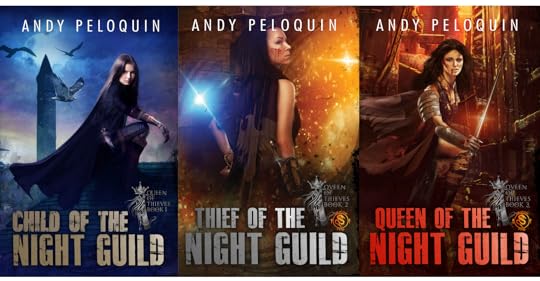
Tell me about an unexpected thing you’ve learned, and how you’ve worked it into your book.
For the Queen of Thieves series, I found myself binge-reading a live “instructional” book by a prolific cat burglar. It totally changed the way I think about any structure and security system. It shaped the character’s approach to thieving and her methods for defeating whatever defenses her victims had set up.
When does research matter, and how do you incorporate it into your books?
Research ALWAYS matters. I research everything from technology to sociology to religion to psychology to even food and drink preferences of the people and worlds I write. I do a lot of research to get to understand the characters before I sit down to write them, but I tend to only research the worldbuilding elements as I needed.
Have you ever researched something, and what you’ve learned completely changed your book? What was it, and what did you do about it?
Absolutely! My understanding of special forces snipers was totally incorrect, as I discovered when I read through the U.S. Army Sniper Training Manual and the Navy SEAL Sniper Training Manual. It basically forced me to change the entire mission my sniper MC went on, how he approached taking out his target, even things like the technology used to take the shot. But it made the book exponentially more interesting as a result of this change.
Let’s talk about BOOKS
What’s your favorite book as a child?
Sherlock Holmes. It was the first book I was ever given, and I devoured the complete volume cover to cover in less than a week. I actually tracked down a copy of the exact same edition and keep it on my shelf.

What book(s) or authors have influenced you, and why?
The scope and breathtaking epic size of Brandon Sanderson’s worlds are something I envy and will always strive to reach. The genuine humanity of Scott Lynch’s characters and the humor of his writing are another goal I am working towards. And the sheer rawness of Joe Abercrombie’s work always blows me away.
Tell me about an underappreciated book, and why everyone should read it.
Queen of Bones by Gregg Zimmerman. It was the first story I read where a character’s disability (rheumatoid arthritis) isn’t just a character flaw or aspect, but their SUPERPOWER (it warns the MC of impending solar flares, giving her time to get to safety while everyone around her has no clue that the danger is coming). I loved how he made what most people would treat as a weakness as the thing that made the character stand out above the rest.
Hobbies & All Things WEIRD
When you aren’t writing, what can you typically be found doing?
Living in Canada the last couple of years has made me a bit more outdoorsy. I love kayaking, snowboarding, some hiking, and just being outside. For short periods of time. Then I come back and enjoy video games, reading, or TV with my family. I’m also a total sucker for any complex board game like Catan, Carcasonne, or Pandemic.
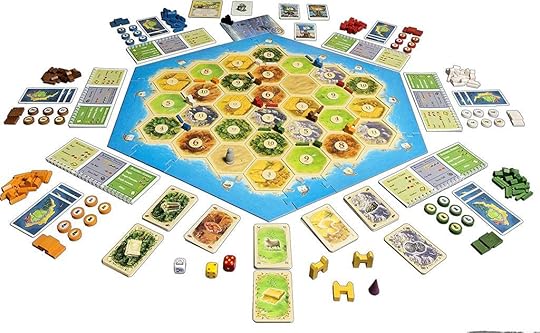
What’s something you want to learn how to do? Why?
Fence, or swordfight HEMA style. I love martial arts, and who wouldn’t want to be a giant (6’ 6”) sword-wielding medieval badass? Plus, it’s amazing exercise!
What’s your strangest talent?
I do a pretty mean bear/wolf/monster roar.
Best comic book character ever. Why?
Deadpool. Because he’s Deadpool. No one else brings that unique mix of humor, sarcasm, insanity, epic violence, and amoral character development like him!
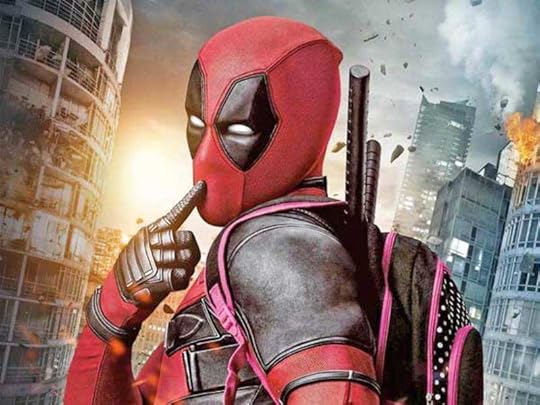
What’s your favorite holiday and why?
Valentine’s Day. I’m a total romantic at heart, and I love planning surprises to spoil my wife. Valentine’s Day just gives me an excuse to do so.
What’s your favorite food from a country you do not live in?
Tacos. That’s kind of cheating, as I lived in Mexico for 16 years, and I’ve tasted A LOT of amazing tacos. Even after leaving the country, it’s still the one food I can’t live without.
Sarah’s note: Thanks, now I want tacos.

Any final thoughts?
I’d pass on one piece of advice to authors: end with hope.
Stories can be dark—heck, I love a grimdark, bleak story as much as the next author and reader—but I prefer mine to end on a note of hopefulness. There’s no happily ever after, the battles aren’t always over, and there may not be a “perfect” future in sight. But in the final pages of all of my stories, I make sure that the characters walk away with a hope that things will get better, no matter how dark they may seem now. And that’s something I love to see in other stories—it gives us hope that the same thing can be true in real life!
Thanks for stopping by, Andy Peloquin! Remember to stop by his website and buy his books!
November 17, 2020
Review | A Wizard’s Sacrifice – A.M. Justice

About the Book
Conquering Fate Takes Sacrifice.
Victoria of Ourtown believes two things: that the bright, wandering star in the heavens is an abandoned spacecraft which brought her ancestors to this world and that destiny and the will of gods are nonsense. Vic used to scoff at stories of wizards too, until she acquired their powers. Once a warrior, now a secret wizard, she just wants to live an ordinary life and find a way to atone for the mistakes she’s made.
Ashel of Narath knows that the wandering star is the god who created humanity, but this difference of opinion doesn’t stop him from loving Vic. All that keeps them apart is a thousand miles and a tragic loss.
Lornk Korng needs Vic and Ashel to execute his plans for conquest. The fact both want him dead is but a trifling snag in his schemes. A bigger problem are the world’s indigenous aliens and an ancient enemy whose victory could wipe out humankind.
As plots and counterplots clash across time, Vic and Ashel must choose their allies carefully, or risk losing not only each other but everything they know.
A gripping tale of wizardry, warfare, and moral dilemmas unspools in a breathtaking blend of fantasy and science fiction.
529 pages (kindle)
Published on October 6, 2020
Buy the book
This book was provided by the author in exchange for an honest review.
If I’ve said it once, I’ve said it a thousand times. I love the fantasy books that decide to turn away from normal and do their own thing. A.M. Justice has done that with her series that is a unique blend of fantasy and science, technology and magic. So far, this series is two books strong, but I don’t really think it’s mandatory to read the first book before reading the second. Each of these books tells its own story and starts at a unique point. Self-contained is a good term for it, which is another point in its favor. I have cancer brain, and a lot going on. Books that can stand on their own are books that interest me. I think there’s not enough said for standalones, and books that are tied together, like the books in this series.
In truth, this book opens up with a bang, and it doesn’t stop its relentless forward motion until you read the last page. This is a dark fantasy, and within the first few pages you’ll read about trails of corpses, so go into it prepared. While the violence doesn’t last throughout the entire book, there are also some pretty heavy themes in this book. It does earn its title of dark fantasy. I love that kind of thing, but for readers looking for a more gentle read, you’ll likely want to pass over this one.
Justice is a medical writer in her daily life, and that strength of hers to know science, and to understand how to write about it really shines through in A Wizard’s Sacrifice. Her ability to marry fantasy and science is really one of the most delightful parts of this book. Magic is derived, basically, from parasites. While this planet had been inhabited in previous generations by interstellar travel. Though much of the technology has been lost, the echoes of it remain. The planet this book takes place on is stunningly well-wrought, full of dynamic, unique people (and creatures), this interesting magic system, and plenty of social stratification and related issues.
This isn’t a book you just sit back and read. The truth is, a lot of it is uncomfortable, and thought provoking. A Wizard’s Sacrifice is aptly named, and it should be noted that sacrifice is never sacrifice unless it’s painful.
While I do think the worldbuilding is really where Justice’s talent as an author shines its brightest, the characters in this book are equally polished to a powerful shine. The story really centers around Victoria and Lornk. Victoria and Lornk are characters whose stories intertwine in some really agonizing ways. The tangled threads of their lives are actually the thing that really drives the plot and tells the story. Lornk really stole the stage in my eyes, but I really, really like a well-crafted antagonist. Furthermore, secondary characters are well-crafted, and rather than being propped up in the background, they play a solid role in the book, and will leave you with impressions that don’t fade, which is the hallmark of a good character. It helped to see how others interpreted the events going on, and the main players. All of this, added together, made the book feel stunningly well-rounded.
There are some themes that I was delighted to see, as I don’t think they get enough time and light in fantasy. For example, psychological issues, like post-traumatic stress disorder. These can be minefields for authors to write about. They are tricky topics that require a lot of research and a very careful hand to do them justice, and I was really excited to see them in this book. Representation matters, and I think a lot of people will see the careful handling of psychological conditions like PTSD and see a bit of themselves in the book. This matters. Bad things happen to good people, both in this book and in real life, and I was really excited to see the author shine a light not just on the bad things that happened, but their effects, that shape lives.
More than that, A Wizard’s Sacrifice is heavy on the political intrigue, which I loved. Seriously, LOVED. IT. I’ve been reading this biography of King John (you know, the guy everyone hated in the 1200s in Britain). I realized today that the reason I loved this book so much is the same reason I loved reading about the early life of King John. It’s all this really twisted political intrigue and it just works for me on every level. Henry II didn’t name a successor, and so his sons were tearing each other apart. Then he had all these illegitimate children on the sides causing their own problems, and just totally messing things up. This rivalry must have been hell to live through, yet as a reader, I can’t stop thinking about it.
And that’s really what you have here. You’ve got this level of intrigue, family rivalry, squabbling and the like that put my ass in the chair. It’s really well done, and despite how tangled the web got, Justice made her way through it, and takes her readers along for the ride. I not only enjoyed the family dynamics, but the politics as well, and how one thing impacted the other on profound levels.
The plot is evenly paced, never a dull moment. Even the quiet lulls lead to important points if you pay attention to the breadcrumbs the author lays down. Everything means something. I love books that work with layers, and this one absolutely has them. There’s the surface action, and then there’s everything happening a bit deeper down. Like an iceburg, if you only focus on the part popping out of the water, you’re missing so much.
A.M. Justice is an author who caught my eye with her first book. Her second book, A Wizard’s Sacrifice, really launched itself over the bar she set with A Wizard’s Forge. I loved every part of the experience of reading this. The mind that crafted such an intricate work is something to truly be admired. I hope that more fantasy readers take the time to discover this author’s books. She deserves so much attention.
Trust me, you won’t regret it.
5/5 stars
November 16, 2020
Indie Author Interview | Ben Galley

Ben Galley is an author of dark and epic fantasy books who currently hails from Victoria, Canada. Since publishing his debut Emaneska Series, Ben has released a range of epic and dark fantasy novels, including the award-winning weird western Bloodrush and standalone novel The Heart of Stone. He is also the author of the critically-acclaimed Chasing Graves Trilogy.
When he isn’t conjuring up strange new stories or arguing the finer points of magic and dragons, Ben enjoys exploring the Canadian wilds and sipping Scotch single malts, and will forever and always play a dark elf in The Elder Scrolls. One day he hopes to live in an epic treehouse in the mountains.
Ben can be found on Twitter or vlogging on YouTube, or loitering on Facebook and Instagram. Get The Iron Keys, an exclusive, free short story set in the world of Emaneska when you sign up to Ben’s Guild Newsletter. Or, just go to his website for all Ben’s info, as well as Goodreads.
First off, describe yourself in six words or fewer.
Somewhat human.
Tell me about your book.

The latest tome of mine to hit the shelves is The Forever King – a brand new Emaneska book that kicks off a whole new series set in the same world. I liken Emaneska to Game of Thrones meets Die Hard, and this new instalment follows that trend with a host of new and old characters, each forced through hell and high water for my own amusement and readers’ enjoyment. The world is packed with dark forces, dragons, daemons and gods who play games with humanity.
The story in a nutshell is this: all use of magic has been banned in Emaneska under the Arka Empire. Only the Outlaw King in the far north continues to rebel, but thanks to the emperor’s lies, few hold him a hero. Least of all Mithrid Fenn, a cliff-dweller of Hâlorn, who finds the war has arrived at her doorstep all too abruptly.
What makes you and your books unique? Shine for me, you diamond.
*sucks in breath* Well, if I may toot my horn, I pride myself on being as original as possible. It’s a tall order these days, but I try to be unpredictable, to break rules, and to drag into the light areas or concepts that have only been touched on. I feel – hope – that I’ve done that with my books.
What are you working on now/any future projects you want to talk about?
Right now, I’m working on the sequel to The Forever King – Heavy Lies The Crown, and at the same time, I’m co-authoring a book with fantasy legend David Estes.
Let’s celebrate. What’s one of the best things that’s happened to you as an author? Don’t be shy.
Here’s that horn-tooting again, but the finest moment has to be becoming an Amazon bestseller and rubbing shoulders with George RR Martin. If only for a few weeks.
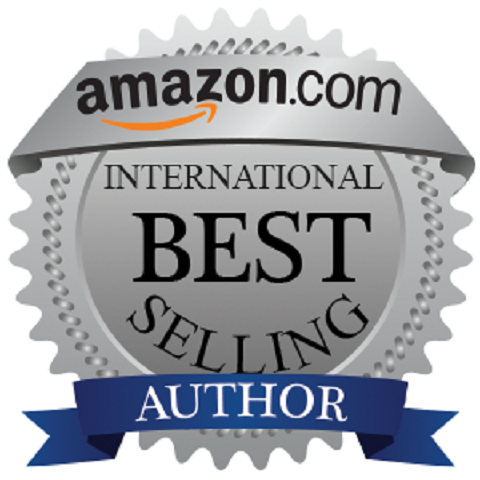
Let’s talk about CRAFT
What is one thing that you’ve learned about yourself as a writer?
That I use the words “gurn” and “smirk” in amounts that, frankly, should be made illegal under the Geneva Convention.
If you had to start over with writing and publishing, what would you do differently and why?
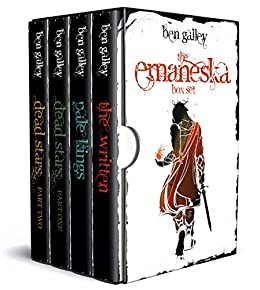
Though the idea of writing all those books again makes my brain want to flee for its sanity, if I were to go back in time, I would stay in my comfy wheelhouse for longer. When I first published, I was writing epic nordic fantasy – The Emaneska Series. This series was – and continues to be – a great success thanks to its characters, world, and my penchant for brutality. Yet instead of capitalising on that early triumph, I was so excited to jump into a new world, I jackknifed hard into the realm of western fantasy and alternate history. Actually veeeerry different in fanbase compared to epic fantasy and sword and sorcery. Even though I’m convinced everything happens in its order for a reason, I see now it made more business sense to stay in my established genre, and build, build, build. That’s actually what I’m doing now, 10 years later. NO REGRETS.
Tell me about something odd you do when you write? Something about your particular process that is distinctly YOU.
If I’m writing in an accent or specific voice, I mumble along in the accent or voice to get inflections and cadence right. What’s funny is I forget to stop it when other people are around. Like the general public.
Do you listen to music when you write? What kind?
Constantly! I find music fuels me, lends me emotion or verve, and sets a soundtrack to my scenes. As for the kind, it switches depending on scenes. For snark and action, I usually lean towards my favourite genre of metal, or something at least with a fast beat and lots of energy. Otherwise, for scenes with a lot of concentration or emotion needed, I stay away from anything with lyrics, usually OSTs from films such as American Beauty, or Theory of Everything, for example. Every now and again I simply use white noise of rain or thunderstorms.
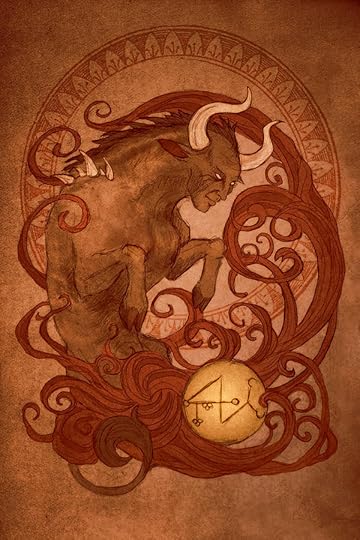
What are some of the most interesting rabbit holes you’ve found yourself lost down?
The Pseudomonarchia Daemonum and the Art Goetia, detailing the Goetic Demons, and the idea that King Solomon was so wise because he simply summoned all of these daemons in his basement and asked them the answer. The most elaborate Google ever conceived.
Weapons are cool. They often require research. Tell me about a cool weapon you’ve researched and used in your writing.
Weapons ARE cool, and for my Scarlet Star Trilogy (my alternate history weird western), I got a chance to mess about with guns as well as swords for once. Now, I’m not a gun nut, but there’s something visceral about pitching magic against 18th and 19th century guns, or raw elements against technology. For one scene, I had to look up the largest guns ever made. Enter my two favourites, the 1,500 ton Schwerer Gustav, which was built to fire across the English Channel during WWII, and the modern Pfeifer Zeliska .600 Nitro, which is a hand-cannon built around the theme “ridiculous”.
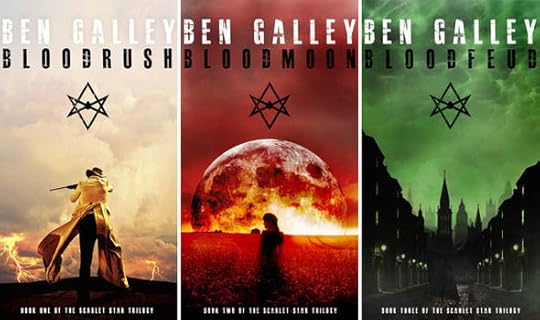
Let’s talk about BOOKS
What book(s) or authors have influenced you, and why?

The biggest influence in my writing career was American Gods by Neil Gaiman. This book was handed to me at a time when I was struggling deeply with where I was headed in life. I’ve always written, but as a career choice, it had fallen by the wayside during college and pursuing the music industry. American Gods reignited the old love for mythology I’d forgotten, as well as taught me a new way of telling the oldest of stories. It lit a bonfire beneath me. 18 months afterwards, I published my first book, The Written. Three years later, I got to thank Neil in person at a World Fantasy Con.
What’s your bookish guilty pleasure?
It started when I found a copy on a train during my school years, but Clive Cussler’s Dirk Pitt novels. Predictable as hell, very much a formula that works over and over, but packed full of India Jones-esque action, with marine biologists kicking arse all over the place. There’s always a hidden world order, ancient curse, or Peruvian gold cartels behind the plot. So. Damn Enjoyable. The older ones are the best, such as Sahara or Atlantis Found.
Hobbies & All Things WERID
When you aren’t writing, what can you typically be found doing?
When I do allow myself one of these fabled days off, I can normally be found yelling at zombies or aliens on the Xbox, grilling something, or exploring a new trail or part of the coast. There is also a lot of lying down, these days.
What’s something you want to learn how to do? Why?
I have a thing about sailing at the moment. I guess it’s living on Vancouver Island, surrounded by whales and wildlife and the open Pacific, and the amount of islands here are mind-boggling. The quiet of sailing, combined with being a mere, wind-blown speck on a vast ocean, is perfect. I’ve sailed a few times with friends, but I would love to master the ropes. Literally.

What’s your strangest talent?
I can do the best Gollum impression you’ve ever heard. “Oh, everybody says that!” No. They’re wrong.
Tell me about something in your life that brings you joy. What is it, and why?
Wildlife. The minds of creatures are utterly fascinating to ponder. I’m the guy that will talk to your dog but not to you. Or spend an hour trying to feed a stray. I spend half my day ogling the hummingbirds that come to my feeders. I think that’s why fauna features in my book so heavily.
If you had to pick a superpower, what would you pick and why?
Telekinesis for dual reasons. Reason the first: mischief and mayhem. Reason the second – and one benefit of telekinesis that I think goes overlooked – but I could also fly. However, I actually do have a real-life superpower that should fill you with awe and terror. I have the ability to see any Magic Eye picture almost instantaneously.
We all have family recipes. Share one of your favorite ones.
Witness the “Ben Special” – the ultimate comfort food. Take two giant potatoes, bake them, then cut them open. Put two frankfurter sausages (the good kind – if they come in a jar, put them back) in the potatoes. Smother in baked beans and sharp cheddar cheese, microwave until it’s bubbling. Black pepper and worcester sauce to taste.
Tell me a strange, random fact.
Polar bears cannot be seen by using night-vision equipment, which I believe makes them the perfect modern assassins.
Sarah’s note: HOLY SHIT I DID NOT KNOW THAT.
[image error]
What’s your favorite swear word and why?
It’s one of the oldest, the most phonetically satisfying, and even though it is used mostly as punctuation in the UK at this point, it seems to retain enough potency to turn the stomachs of many Americans. It is the C-Bomb. Otherwise, we British have the wonderful ability to make up rafts of alternate swearwords when needed, such as the classic “twatwomble”.
Any final thoughts?
How does one go about training a polar bear in martial arts?
Thanks for stopping by, Ben Galley! Remember to stop by his website, and buy his books!
November 13, 2020
Indie Author Interview | Jordan Loyal Short
This is part of a new series of interviews featuring indie authors. These interviews will drop once or twice a week. If you’d like to be part of this series, please contact me at Sarah (at) bookwormblues (dot) net. Please support the authors by clicking on the affiliate links in the interview, spread the word, and, of course, buy their books.
We’re all in this together, you know?
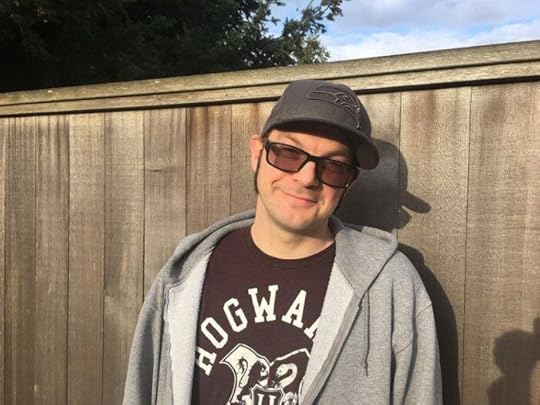
About the Author
Jordan Loyal Short is an author of epic fantasy. His first novel, The Skald’s Black Verse, is a dark and beautiful story about families, cultures, and beliefs at war with themselves. The protagonist, Brohr, must navigate the tangled loyalties and unforgiving biases of a planet conquered by invaders from another world. Using black magic, and the bizarre bond he shares with his stillborn brother’s spirit, Brohr unravels the truth about himself and an eon spanning war that has reached its end game.
You can see Jordan’s latest book reviews at Booknesteu.com.
Jordan has worked in a variety of industries, as a waiter, bartender, copywriter and more. He lives in Washington state with his wife where he is currently daydreaming about the end of the world.
Links
Website
Twitter
Facebook
Amazon

First off, tell me about your book.
The Skald’s Black Verse is a dark tale that mixes sci-fi and epic fantasy. It’s about a haunted young man, Brohr Nilstrom, whose grandfather has raised him as a weapon against the people who have conquered their world. An apocalypse looms on the horizon and the grandfather seizes upon it to launch his bitter rebellion, but behind the scenes we glimpse an ancient race of demigods pulling the strings. When Brohr is framed for a murder he goes from outlaw, to rebel, an anti-hero who ends up responsible for the fate of his people.
What makes you and your books unique? Shine for me, you diamond.
Most noticeably it’s the worldbuilding. Readers will find a solar system steeped in history, myth, and mystery. Ancient magic fills the role of technology, and enigmatic relics enable a spacefaring culture. The characters too diverge from your standard fare, warped into darker hues by the pressures of calamity. There are light moments, peppered in to keep the narrative dynamic, but each soul who populates these pages is faced with moral dilemmas for which there are no easy answers.
What makes me unique? Am I the only one utterly petrified by this question? I will spend the next decade fretting over this question and get back to you.
What are you working on now/any future projects you want to talk about?
I am now diving into book three of the Dreadbound Ode. My working title is Journey of the Dead but I haven’t kept the working titles for books one or two so no reason to suspect it’ll stick. Outlining is finished and I’m currently in the middle of the first draft. I want to talk about it sooooooo much. I have never been so excited about the potential of a story I’ve worked on. But I shouldn’t spoil the surprises in store.
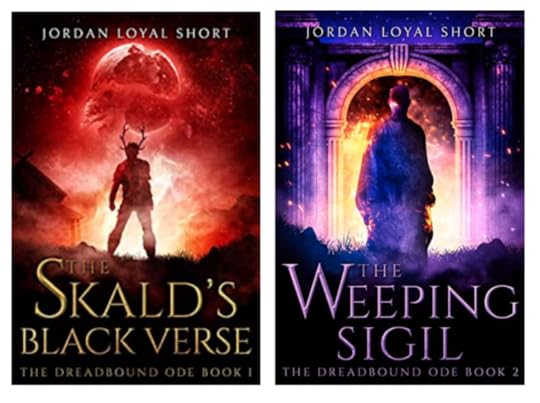
Let’s celebrate. What’s one of the best things that’s happened to you as an author? Don’t be shy.
Honestly, it’s just the slow grind. At first, self-publishing feels like you are screaming into the void. No one cares. I’ve just started to hit my stride. I’m now finding other authors who enjoy my work and getting good reviews. That validation is really important, and it definitely doesn’t come automatically. Writing a book is a lot of work, and when you find someone who genuinely appreciates it, that is a moment to celebrate.
Let’s talk about CRAFT
If you had to start over with writing and publishing, what would you do differently and why?
I would probably start with a stand-alone novel instead of a trilogy. I definitely created some additional challenges for myself by committing to a huge multi-year project right out of the gate. On the other hand, I’ve recently begun writing the final installment of the Dreadbound Ode and I’m starting to feel all of the pay offs for that work. Not necessarily in terms of publicity or book sales, but the story itself. Making all of the connections that span a three book arc come together is intensely rewarding. I haven’t even finished writing the book and I’m champing at the bit for people to read it.
Tell me about something odd you do when you write? Something about your particular process that is distinctly YOU.
I like to use post-it notes to construct a scene by scene outline on my wall. They are all color coded by POV character. So the walls in my writing nook are covered in post-its.
Plotter or pantser, and why?
I was a pantser until I finished the first draft of The Weeping Sigil. As I was wrapping it up I knew it was trash. All of the plot fell into place and the people went places and did things, but it had no emotional resonance. So, with a dramatic sigh, I tossed it in the garbage and basically started over. I had participated in NaNoWriMo the first time around and really rushed through it. So instead I took a step back and cut about 90% of the book, added some new characters, cut some dull plot lines, and really dug in to making a plan for the book. That’s when I started with the post-its. I’ve just finished outlining book three and I’m really excited. Creating a thorough outline helped me to see some pitfalls in the road ahead long before I got there. Which is nice for a change instead of tripping over them face first into a tiger pit.
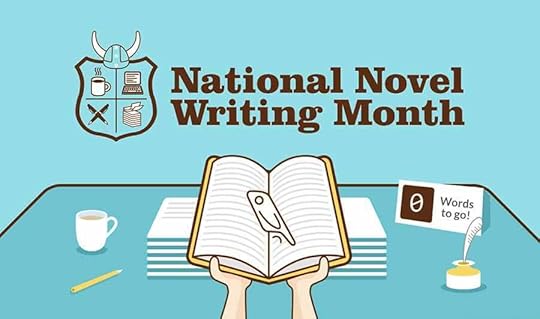
How has technology, and research of technology, influenced your writing?
I keep trying to use dictation software, but apparently I mumble, so the document ends up reading like a six year old trying to explain a video they once saw on youtube while taking nips from a sippy cup full of crème-de-menthe.
Let’s talk about BOOKS
Let’s throw some light on diversity. What are some books you love that feature diverse characters, diverse authors, etc.
Toni Morrison. Her talent was incredible, humbling too. I also love Junot Diaz’ the Brief Wondrous Life of Oscar Wao. David Sedaris is my favorite memoirist …I’m still chuckling at the shit he writes. I was able to see a reading of his a couple of years ago and it was a lot of fun, and very touching at moments, just like his writing. Recent fantasy authors I’ve come to appreciate include Fonda Lee and Evan Winter, both Jade City and The Rage of Dragons are new and mesmerizing reads worth top slots on your TBR. Also, I just started reading The Poppy War by R.F. Kuang this morning and I’m already hooked.
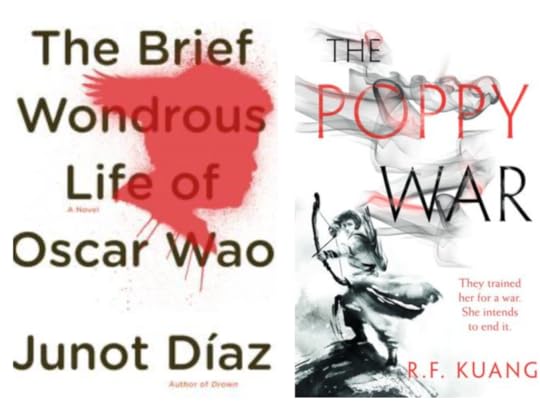
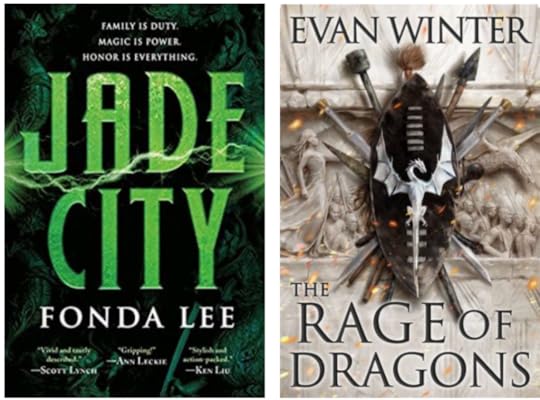
Hobbies & All Things WEIRD
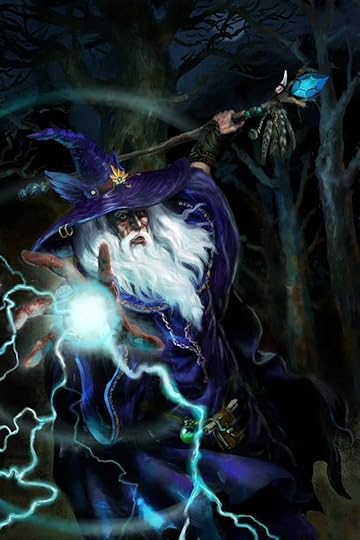
I am a firm believer that we all have to be a little weird to do what we do. What makes you delightfully wacky?
Is there a time limit on this one? Ok…well, first of all, I spend an inordinate amount of time daydreaming about being a wizard. Honestly, I think it is one of my key coping mechanisms. Sure it helps flesh out fiction some times. But most of the time I’m just cruising around weird vistas in my head zapping heavies with lightning bolts and pouring over tomes of arcane lore for the true names of dread powers who lurk in the corners of my imagination. In order to legitimize this hobby, I also play D & D and write fantasy novels. I could go on, but people may read this interview so I should probably limit myself to one embarrassing secret at a time.
What’s a hobby you had as a child that you no longer do?
Do drugs count?
Any final thoughts?
Thanks for letting me drop by for the visit, Sarah! I appreciate everything you do for this community. In case anyone didn’t realize, Sarah was also my editor on this book and she really helped me to punch it up and make the story more visceral and emotional. So, if you are looking for a book full of blood magic, alien mysteries, political machinations, and characters struggling to make the best of truly dire situations, check out the Skald’s Black Verse and The Weeping Sigil. Thanks again!

Thanks for stopping by, Jordan Loyal Short! Remember to stop by his website and buy his books!
November 11, 2020
Review | Cold West – Clayton Snyder

About the Book
Bastard. Killer. Husband. Father.
His wife cold in the ground, and two young boys to feed, Wil Cutter turns to what he knows: Violence. But a bounty is never just a bounty, and blood is never spilled in drops. Forced to ever more violent acts, he’ll have to ask himself: Is Hell too far to ride?
204 pages (kindle)
Published on February 29, 2020
Buy the book
This book was sent by the author in exchange for an honest review.
—
I am a big ol’ Weird West fan. I don’t think that needs to be a secret. I live out here in the west, and I see so much from history and the like that is just ripe for the plucking, waiting for some author to see it, and turn it into an amazing story. Weird West fantasy is my bag. It doesn’t tend to get a ton of attention in the genre, and I think that’s absolutely criminal. A really good fantasy western is every bit as exciting and gripping as anything else you could ever read.
Basically, if you aren’t reading this subgenre of fantasy, you’re really missing out.
Now, for reasons of transparency, you should know that Clayton Snyder is someone I consider a friend. I also think he writes some absolutely masterful fantasy and is one of those criminally underrated authors that you really all need to read more of. I’m not just saying that because he’s my friend. I read his books before I ever had personal interactions with the guy, and my opinion of him as one of the most talented, unjustly underrated authors stems from a time before I went to yell at him daily on a Discord server. However, I’m billing this as a book review, so you should know my potential bias before we move along.
ANYWAY.
Cold West was a book that had me interested the moment he started posting snippets of it on Facebook. Here was a Weird West fantasy, written by an author who has this ability to weld language like a hammer when he needs to, and like silk when he chooses. I knew that Snyder would take a western setting and own it. His aggressive writing style is made for a book like this. Further, this book weighs in at just over 200 pages, so maybe a longer novella/shorter novel. It gives him less time to get into the tone and setting, to drop all the backstory. He needs to get in, and get out pretty quick, and leave the reader with one hell of a story in the process.
I knew all of this before going into the book and I thought, if anyone can pull this off and leave me reeling, it’s Snyder.
They say when a man meets the love of his life, all the mean goes out of him. Sometimes in small bits, like venom leaving the blood, sometimes in great rushes, like an open artery.
Cold West is a really interesting book, in the fact that there is a lot of violence and pain that is the driving force moving the plot forward, but if that’s all you see, you’re overlooking so much. One of the things that I love about Snyder’s work, is how he works on numerous levels. The guy is really, really smart, and it seems that even in his everyday interactions, he’s never sticking to surface level. He seems to understand deeper ramifications, emotions, and themes more than most other people I know, and he brings all that into his writing.
The book begins with Wil Cutter losing his wife to illness, and being left behind with her memories, and two small boys to take care of. Instantly, the feel of loss and emptiness is vivid, stark, and well-realized. It’s these emotions that I’m teasing at in the previous paragraph. There’s a lot of action in the book that makes the surface of the story very exciting with relentless forward motion, but if you’re overlooking the loss and heartache, the quiet emptiness that fuels the entire thing, then you’re really only seeing a fraction of what Cold West is actually about.
The world building is also interesting. Usually in western fantasy, you expect a more western setting. Expansionism, the western motion of men into uncharted lands and the like. In this book, there is a feel of that, but there are also hints of something else. Something atypical, and eye-catching. Dukes and lords are mentioned. Holdfasts exist. Airships. Ghosts and nulls, hints of magical elements. All of that is decidedly not what you’d expect in a book with this setting. And, to be honest, that’s part of what intrigued me. Furthermore, there’s a hint at more. A hint at all sorts of things that are just beyond the immediate scope of this book. That hint, that tantalizing more, gives readers a sense of depth and well-rounded, fully-fleshed world building that really worked quite well for me as I read. This is a book all on its own, but it’s also set in a world that was vivid enough for me to easily picture more being written here.
I blinked, saw the ribs of an airship, long covered with sod and lichen jutting from the ground. Ivy wrapped around the struts and bright pink flowers the size of my fingernail bloomed there. A crater filled with rainwater. The skeleton of some horror the Nulls had brought into being. Ghosts at the edge of my vision.
The setting of the book is truly simple, and delightfully so. Essentially, Wil Cutter’s wife dies, leaving him with two boys, no money, and a farm he has no real ability to work. However, Cutter’s past was a violent one. He is good with a gun, good with a knife, better with violence, sucks at farming. After his wife dies, a bounty is called on some people. A visitor comes to tell Wil of this, and Wil, realizing he needs money and agrees to take this task on. Leaving his sons behind for a week, maybe two at the most, he starts off to do something that is pretty straightforward and ends up anything but.
Wil’s voice is unique and unforgettable, as tough and hard-bitten as the land he inhabits, and I was instantly pulled into his story and the way he told it. I love strong, character-driven fantasy, and Cold West is exactly that.
The oddness of this book sort of creeps up on you. From hints of unique worldbuilding peppering the pages throughout, to the slow, if somewhat predictable start, Snyder lets the plot itself, the thing that makes Cold West so absolutely addicting, sneak up on you. It is pulse-pounding. It is graphic and violent. There is a lot of blood, but don’t forget those emotions from above. He crafted the book with that particular spine, and there is a reason for that. Under all the guns and blood and adventure, the core of this book is truly about the human condition, about love and family, and in an odd way, even redemption.
And yes, there are humorous moments as well. If you know Snyder at all, you know his books are absolutely never free from snark.
I suppose you’re expecting a great love story here. Maybe some great change she made in my life that pulled me from the blade and the gun. Sorry, just solid love and good sense. Sometimes that’s all you need.
Cold West is a quick read. At just over 200 pages, it should be illegal for a book this short to pack this hard of a punch, but it did. Clayton Snyder is an author to watch. I suggest you get reading.
5/5 stars
November 10, 2020
Fan Art
A few weeks after I released Seraphina’s Lament, I got a notification on Twitter. Someone tagged me in a post. I went to click on it, and it was the most gorgeous artwork I’d ever seen. I was amazed. I literally dropped my phone on the ground and started crying.
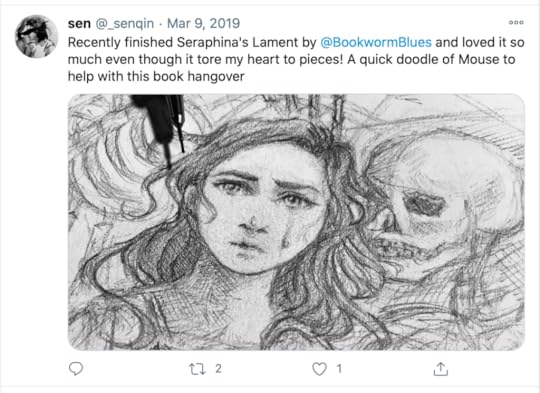
The thing about fan art, is that it’s the highest compliment an author can receive. I firmly believe that. I never quite understood how moving it would be to see fan art until I started getting some. It’s really quite a thing to know that something I wrote was vivid enough in a reader’s mind to create artwork from it. And it’s also really neat to see how what I wrote is visualized by someone else.
Now, to be clear, as far as I know, I only have this one fan artist and that is okay with. me. I’m less here to brag about LOOK AT MY FAN ART, and more to throw some light in this person’s direction. They are an absolutely incredible artist. Each time a bit of new artwork drops, I am moved to tears. The character sketches are just beyond anything I could ever imagine and I think it’s damn near criminal that this artist isn’t better known.
I am not the only artist who has benefitted from the artist’s incredible talent, but I will highlight the character sketches from my books, both Seraphina’s Lament and Of Honey and Wildfires, because they are just so worthy of being admired by more than just me. Every time I get a new twitter notification that I’ve been tagged in a post by them, my heart beats double-time.
With that in mind, I’m going to post the pictures that this person has drawn of characters in my books, and I’m going to put in really big letters, PLEASE GO GIVE THIS ARTIST SOME LOVE BECAUSE THEY ARE RIDICULOUSLY TALENTED AND DESERVE ALL YOUR EYES ON THEM.
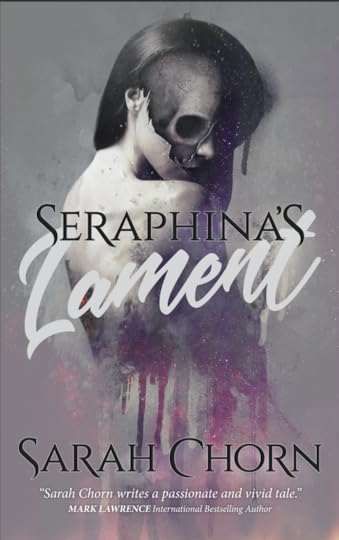
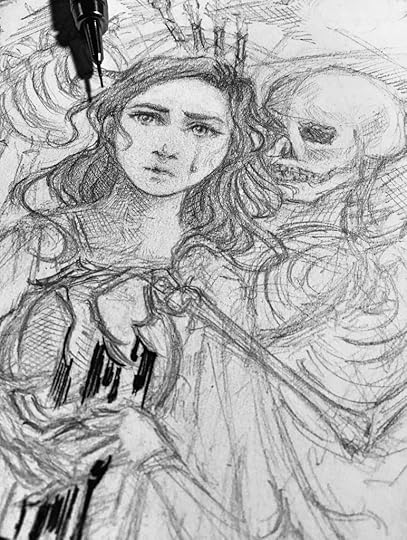
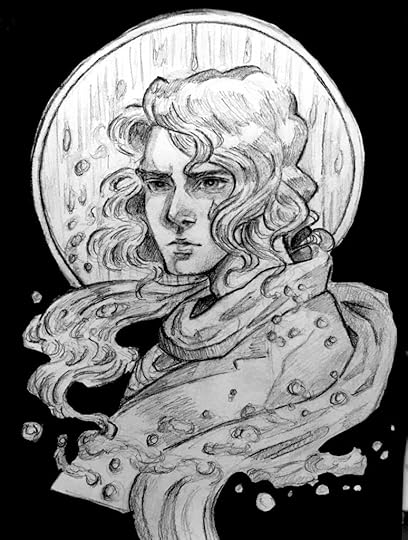
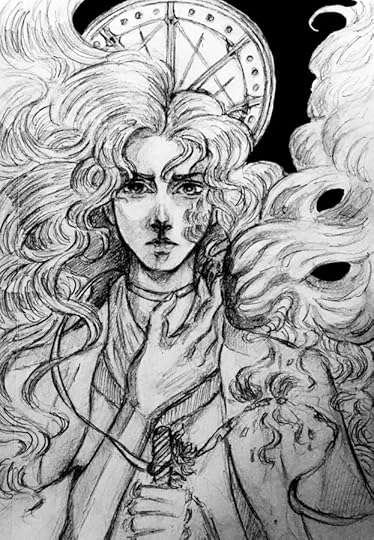
From left to right:
Mouse and Taub, Neryan, and Seraphina
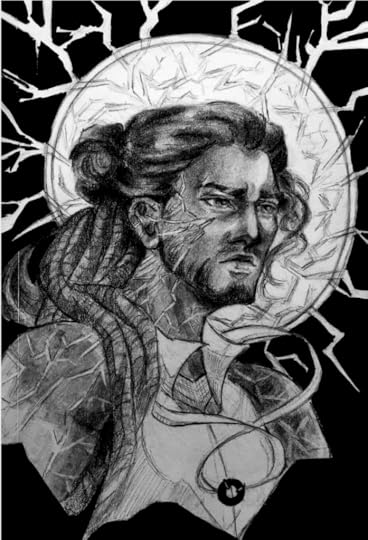
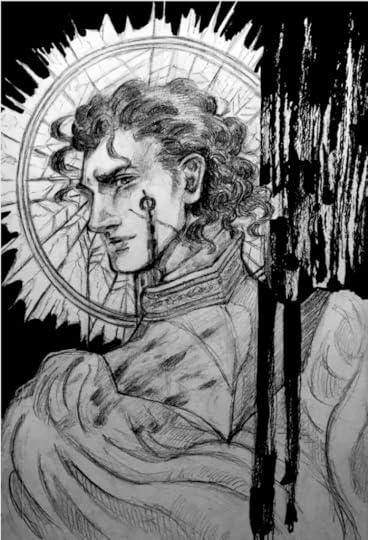
Vadden on the left, Eyad on the right.

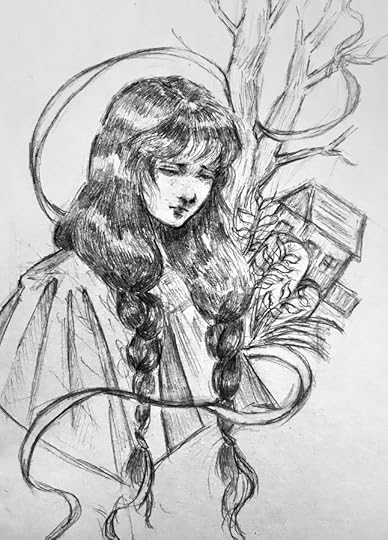
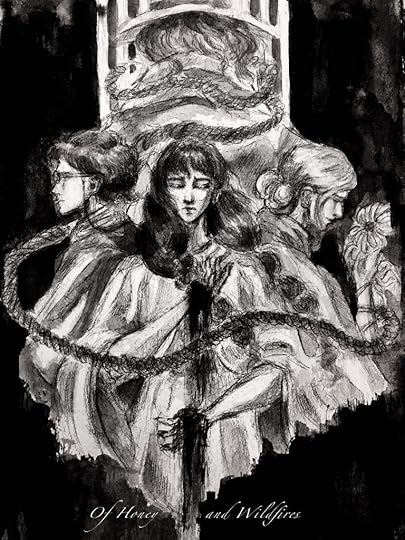
Cassandra on the left.
The picture on the right has all the main characters in it. Cassandra in front. Ianthe on the right. Arlen on the left. Christopher at the back, wearing his hat, standing behind prison bars. The rope tying them all together.
 Ianthe
Ianthe
November 9, 2020
Indie Author Interview | AKM Beach
This is part of a new series of interviews featuring indie authors. These interviews will drop once or twice a week. If you’d like to be part of this series, please contact me at Sarah (at) bookwormblues (dot) net. Please support the authors by clicking on the affiliate links in the interview, spread the word, and, of course, buy their books.
We’re all in this together, you know?
Personal note: I have to apologize. I would have posted this interview on Friday, but with everything happening with the election all week, I was really afraid that if I posted anything, it would be lost under the chaos of all that noise, and I think authors deserve more than that. Therefore, I made the decision for my website to go silent last week while things played out, and delayed the posting of this interview to today in the hopes that more people would see it, and it would get drowned out by *gesticulates wildly at the entire planet*.
To make up for this, I will have three interview post this week.
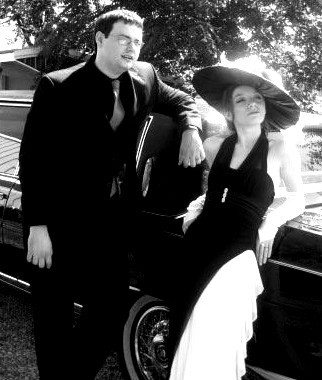
About the Author
A.K.M. Beach is the shared pen name of a husband and wife duo living in upstate New York. In 2006, two undead priests came together to guard a tattered flag in Warsong Gulch, beginning a partnership that soon transcended universes. It was only a matter of time before they set out to create a universe of their own. Outside of writing, Ash spends her time yelling at health insurance companies and trying to pierce the cloud of unknowing; Matt orchestrates everything from sweeping plots to trifling intrigues, talking in funny voices all the while.
Links
Twitter
Website
Goodreads
Facebook
Amazon
—
Describe yourself in six words or fewer.
Isaac and Miria, minus the immortality.

Tell me about your book.
From merchant to baroness to banshee: a woman tries to break the curse on herself and her subjects by solving the mystery of the castle she haunts. Through communing with various objects, she salvages memories of her former life and relives her rise and fall.Our editor calls it “Crimson Peak meets high fantasy”. Lady Vago’s Malediction is a love letter to vintage gothic novels but flips the script on some long-standing conventions: when the heroine arrives at the castle, it’s pretty dang new and in great shape actually, and she’s the one with the dark, mysterious secrets. The marriage is remarkably healthy and low-key, and the man she loves is not an ill-tempered, overly demanding brute. All that said, there’s still plenty of dread and tension to go around, which our readers say makes for a real page-turner. Considering the remarkably low volume of stabbing and explosions, this makes us very happy!
What makes you and your books unique? Shine for me, you diamond.
Secondary world, medieval gothic fantasy is hard to find outside of major franchises like Dark Souls and Castlevania. We’ll give you that aesthetic, and any screams of rage and despair won’t be because you just died for the thousandth time.
What are you working on now/any future projects you want to talk about?
Well, of course we’ve got the sequel in the works. We haven’t committed to a title yet, but so far Lady Vago’s Absolution has been falling pleasantly upon our ears. It’s going to have almost a gothic buddy cop sort of scenario that has us very excited.
We’ve also got a secret project planned that we’re going to be very tight-lipped about until the appointed hour.
Let’s celebrate. What’s one of the best things that’s happened to you as an author? Don’t be shy.
Oh, gosh, we’re so new at this that every little thing feels like the best ever. Every sale, every review, every time someone adds us to their Goodreads shelf, every time we get a message from a friend or family member saying they stayed up all night reading it or how proud they are of us. We’re a long way from the pinnacle, so for our own sanity we’re consciously savoring every bit of joy to be found in the journey.
Give me an elevator pitch about YOU.
We take turns being the good half and the evil half of the same person.
Let’s talk about CRAFT
How do you build your world/characters? What does your process of creation look like?
Every coauthoring relationship is a unique entity. I think in our case, being husband and wife with two very different skill sets adds an extra dimension of weird (and fun!).
So, almost all of our stories are set in a tabletop homebrew world that Matt has been developing for 20 years. Aside from some hand-drawn maps, though, everything he knew about his world was floating around in his head. Once we had a consistent game running, I became the self-appointed primary notetaker and came to know the world nearly as well as he did, to the point that I was reminding him what he’d named his deities. I even learned Teeline shorthand specifically to take better, more detailed session notes.
 Image from the previously linked Wikipedia page.
Image from the previously linked Wikipedia page.For about 10 years every bit of fiction I wrote took place within that world. I wrote short stories (and a few poems!) to flesh out the different cultures, locations, and what-not. I even spent five years writing and one year pitching a planned series that was a heavily adapted retelling of one of our campaigns. At this time, I still don’t know if the idea itself isn’t viable, or if I just don’t have the chops to pull it off yet. It’s a massive, ambitious project. Regardless, it’s in the trunk for now so it can think about what it’s done to me.
Lady Vago’s Malediction was our first time truly collaborating on a writing project. For years and years, our joint storytelling went as follows:
Matt prepares a really neat adventure. It’s got it all: a killer hook that draws on the core of who the player characters are, evocative setting, challenging encounters, and quirky NPCs with complex backstories driving a lot of action behind the scenes. The rest of the party and I throw a wrench in it all by forgetting and/or ignoring plot points, causing deep offense to people in high positions of power, getting weirdly attached to either a puny minion of the bad guy or some befuddled peasant whose life we ruined somehow, and making questionable tactical decisions in combat. All the things that make tabletop great, right?Cue nerdiest pillow talk ever, where we spend hours talking about everything that went wrong and right, discussing missed connections, speculating on what the rest of the party will do next. Some of Matt’s secrets are given willingly, because I can be trusted to not abuse the meta knowledge, others are inferred with a significant look after I ask all the right questions, and yet others are kept tight under lock and key until the big reveal.
Then, one day, Matt decided he hadn’t said all he had to say about this banshee and her castle. He wanted to reconstruct the backstory of that quest into a coherent narrative, throw it up on Amazon, and see what happened. I was feeling lost in the weeds over a new novel I was trying to get off the ground. I can’t plot my way out of a soggy paper bag, and even though I knew the themes and the characters I wanted, I couldn’t figure out a series of events to hang it all on. I offered to look Matt’s stuff over whenever he thought it was ready for outside eyes, thinking it might help shake something loose for myself.
So, he searched for the notebook he was convinced I had deliberately hidden. (As a rule, if something goes missing in the house it’s my fault.) After looking over his scattered notes, he spent some months translating it all into a 17k-word document, giving me chunks at a time. Sometimes it made him anxious that I didn’t have a lot to say after reading through one section or another. At the time, I didn’t know how to say that it was hard to form words over the sound of all the wheels turning in my head. I’d already loved this goth AF story as it was told through tabletop, but seeing it through the eyes of the people that were previously background characters was tapping into something soul-deep. I knew I wasn’t going to be happy with “just looking things over”.
When Matt gave me the last section, he said all of this was the first draft. I told him it was a sporadically detailed outline. We eventually agreed that regardless of we called it, we were holding something very powerful, but very raw. I’ve always liked Matt’s stories best of all, but…his immense talent for orchestrating a collaborative oral storytelling experience definitely needed a translator if it was going to work in book form.
ASH: You say here that she’s beautiful but don’t elaborate much on it.
MATT: I did say that her hair is black.
ASH: I saw that. What else did you have in mind?
MATT: …
ASH: Don’t sweat it. I have some ideas.
MATT: Great!
*months later*
ASH: Your final chapters are just seven disconnected words and a question mark.
MATT: You said you couldn’t go any further until you knew the shape of the ending and I was getting close to my deadline, so…*gestures* that’s a shape.
ASH: …I’ll improvise. You can approve and veto whatever you want later.
So, this time around, after steps 1-3:
The Matt Draft happened, wherein some characters leaped off the page fully formed and I hardly had to do any work, and others are barely stick figures. Some scenes were fully realized and vividly depicted, while others were little more than footnotes.I took the Matt draft and turned it into the “Ash draft”, with frequent conversations where we clarified worldbuilding, plot logistics, how a character really felt about this, that, and the other thing, etc. This took about 5 months. Considering my first novel took 2 years to draft and 3 years to polish, I was floored by how quickly things were coming together.Matt read the Ash draft to me out loud, often ruining pivotal and emotional moments with wildly inappropriate voices. Kalsten sounded like a mustache-twirling Snidely Whiplash, Rovena was an indignant chipmunk, Dugan was a 1920’s radio announcer, and the narrative had the inflection of a cheesy true crime documentary voice-over. I alternated between laughing and yelling at him, and we both used different highlighter colors to mark the parts that needed work.We did one more pass that fixed the highlighted issues. Since the Ash draft was me making sure Matt and I were telling the same story, this pass was for centering our ideal reader’s experience. Does every scene carry a thread of tension? Is this person’s internal conflict clear enough? Have we laid the groundwork for this reveal to be rewarding? Are all of the bad decisions these people are about to make going to be gut-wrenching to watch or just annoying? Does Ash love commas too damn much? (The answer to that one is ‘yes’.)
After that, our process converged onto the more standard self-publisher’s path: beta readers, professional editing, cover art, formatting, etc. It was so exciting and insanely stressful; we had a tiny budget made even tinier by COVID, but still wanted to do it right. We had to take turns being each other’s anchors. We go back and forth between feeling inferior for requiring two people to do what one person does all the time, and feeling like we’re cheating for having two brains to work all this out. But, we’ve always been happier walking together than apart, and it turns out the same rule applied to the writer’s road.
Do you listen to music when you write? What kind?
Matt gets ideas for everything from character concepts to entire plotlines from music, and my former life as a dancer means I can’t do anything without a soundtrack.
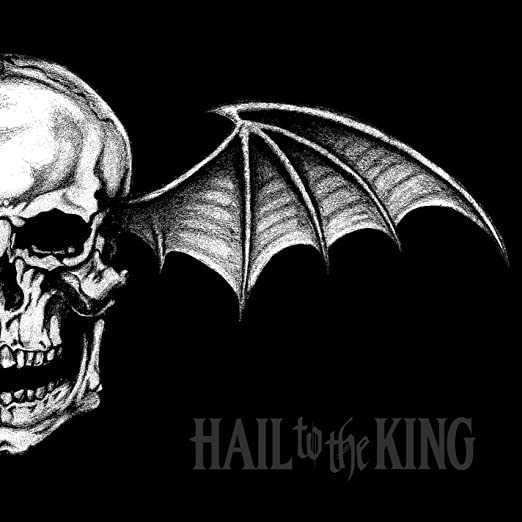 Full disclosure: I chose this album as the image because I think it looks cool.
Full disclosure: I chose this album as the image because I think it looks cool. For how inspiring music is to Matt, the most important part while he’s actually writing is the noise level rather than a direct connection to whatever scene he’s working on. That means a lot of metal, especially Brothers of Metal, Unleash the Archers, Frozen Crown, Ningen Isu, Ghost, and Avenged Sevenfold. But then, he’s also got a playlist of what feels like every horny pop-rock song ever written, which is hilarious considering how prudish buttoned-up he can be in real life. As his wife, I can also say that it isn’t much of an indicator of what he’s feeling at that moment. It’s a mood, but not a mood, if you know what I mean.
In contrast, my own music is hugely thematic and essential for getting me in the right headspace. The three most important albums for Lady Vago’s Malediction were Spiritual Instinct by Alcest, Living Room Songs by Olafur Arnolds, and Stay In The Dark by Lambert. I also relied heavily on some YouTube playlists compiled by Atrium Carceri: “Vampire Ambient”, “Gothic Castles and Fallen Lords”, and “Old Ruins and Ancient Temples” all match the atmosphere of the novel perfectly.
Some standalone tracks that ended up on loop were “Loreley” by Lord of the Lost, “Voices” by In Flames, “Le Miroir” by Alcest, and “Entanglement” by Imogen Heap.
Let’s talk diversity. How do you incorporate realistic diversity into your books? And why is it important to you?
Even though Lady Vago’s Malediction sticks to the gothic tradition of an almost claustrophobic focus on one isolated locale, the empire of Sulthrizania is an ancient thing that has controlled most of the continent for centuries. We wanted to show that a variety of people could live in the Vago barony relatively free from prejudice. Skin color, sexuality, and gender identity are not sticks people are beaten with. The topic of women’s health does get some special attention, because even in societies free from misogyny, having a uterus is just bullshit sometimes.
The real transgression in the empire, which is a major theme, is resisting the rigid divide between the divinely blessed nobility and…pretty much everyone else. Classism is alive and well, and the poor suffer the most, as always. (The dominant belief system of the empire is basically the divine right of kings plus the prosperity gospel turned up to 11.) It is very important to us that we create a world where a reader can insert themselves anywhere within it and no one can tell them it’s not possible because of who they are. Cosplay as whoever and whatever you want! Every cool thing we ever put here was built with extra space just for you, for your enjoyment. It belongs to you, and we want you here.
Tell me about an unexpected thing you’ve learned, and how you’ve worked it into your book.
 Image mined from google.
Image mined from google.We both have a habit of finding happy coincidences while we’re researching that make us go, “Ah! This was meant to be.” Something will feel right, but when we question it, we end up finding another tidbit that makes it all click together even better. Probably the clearest example of this in Lady Vago’s Malediction was the little white cat appearing in the first chapter. Matt knew the cat had to be deaf in order to survive the castle long enough to become Rovena’s buddy. At the time, he was thinking about a friend of ours who had a deaf cat. Our friend’s cat was white, so he made this cat white.
Now, because we share the same impulse to not commit even the most commonplace flora or fauna to paper without looking it up first, Matt says the cat is white, stops and goes “hmm”, then he’s off to the internet. Turns out hereditary deafness is more common in white cats than any other color. What’s more, the likelihood increases depending on eye color. One blue eye means your white kitty has a 40% chance of being born deaf, but if they have TWO blue eyes it’s between a 65-85% chance. And so, to give our little friend the best possible chance at surviving Rovena’s voice, he’s got two sapphire blue eyes.
Weapons are cool. They often require research. Tell me about a cool weapon you’ve researched and used in your writing.
Although it would tilt our hand overmuch to talk about what weapon we actually spent the most time researching, trust us when we say it is undoubtedly and extremely cool.
So, to take the question in an odd direction, we’re going to say the other “weapon” we spent a lot of time on was rhetoric. We both come from a strong sword and sorcery background in our books, games, and general aesthetic preferences, so writing a protagonist who’s most powerful tools are her wits and her words was a big change.
In fact, all the major characters understand the importance of speechcraft: they measure every word that comes out of their mouth on sliding scales of wit, charm, conviction, forcefulness, clarity, and if needed, plausible deniability later. Whether the person they’re talking to is an adored and adoring spouse, an irritable (and irritating) coworker they’re being forced to get along with, or a loyal subject whose life and livelihood is utterly at their mercy, the conversations rarely have just one layer to them.
Getting people to do what you want by way of benevolent but definitely sly social maneuvering is one of the pillars of Dungeon Master life, so Matt already had that inherent tension of push and pull well in place when he was designing this intrigue-laden plot. My job was more or less to go in and jazz up the words themselves. Jane Austen is a masterclass in this kind of dialogue, but for non-fiction sources we mostly analyzed news coverage of religious leaders and politicians of the past and present. People in that line of work know that everything they say can and will be used to either lionize or demonize them. Even someone who styles themselves as a “straight shooter” specifically chose to brand themselves that way to appeal to a certain audience – the mask might closely resemble their real face, but it’s still a mask that was painted with care and deliberation.We hate them for it, obviously, but it’s both their sword and their shield – it’s the only way to survive in such a mercurial environment.
Let’s talk about BOOKS
What book(s) or authors have influenced you, and why?

This has to be a deliberately and heavily truncated list or else it’ll overtake the whole interview. But just to give people an idea…
The influence will come through more obviously in future volumes, but we’re both huge fans of Glenn Cook’s Black Company novels. The metaphysical horror and tragedy in the early volumes of Kentaro Miura’s Berserk manga also resonates strongly with us.
On the complete opposite end of the spectrum, Gail Carson Levine’s work was very formative for me. Of course, it’s nearly impossible to escape Tolkein’s influence, and neither of us have ever wanted to anyway. My heart has ached to be mended in Rivendell ever since I was in single digits.
As an adult, The Last Unicorn became a sacred text to me. I’m an evangelist for Peter S. Beagle. Shirley Jackson is another all-time favorite. She could paint a portrait of domestic uncanniness that rattled people as well as any of Lovecraft’s out-of-this-world abominations.
Let’s throw some light on diversity. What are some books you love that feature diverse characters, diverse authors, etc.
Again, heavily truncated to keep this under control, so this is just from this year:
The Empress of Salt and Fortune by Nghi Vo
Finna by Nino Cipri
Reverie by Ryan La Sala
Mexican Gothic by Silvia Moreno-Garcia
Paladin’s Grace and Swordheart by T. Kingfisher
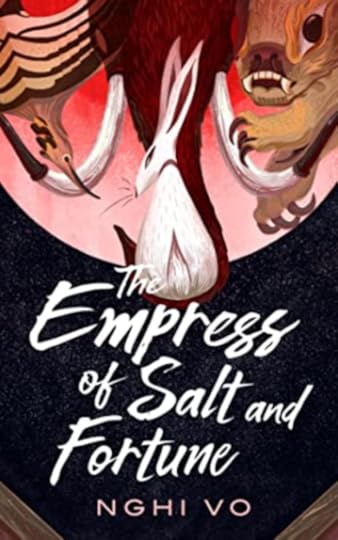
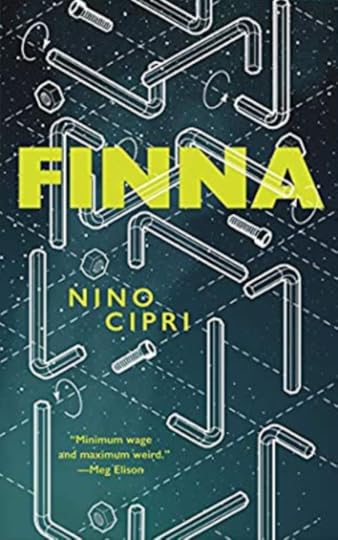

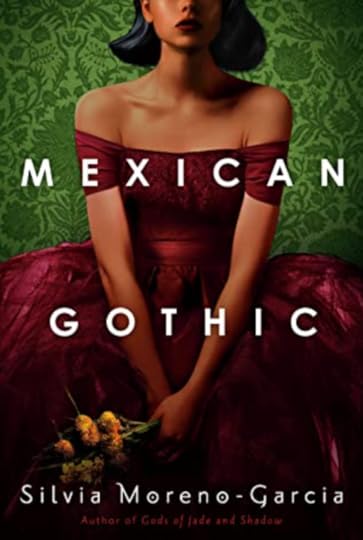
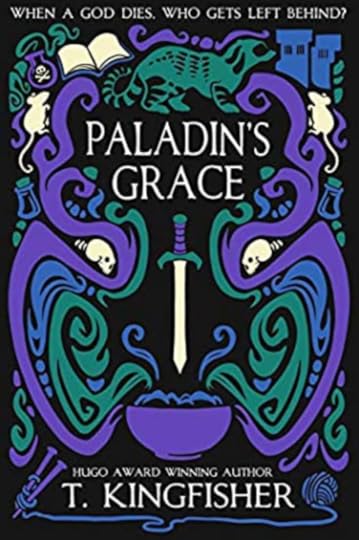
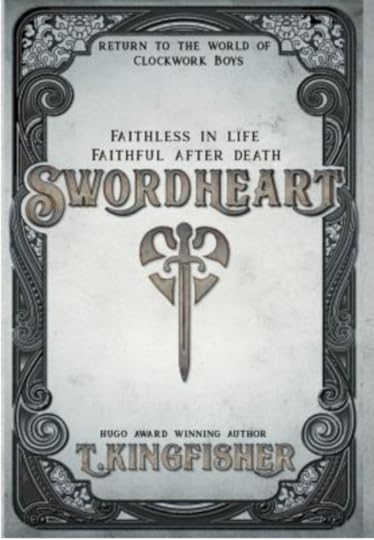
Hobbies & All Things WEIRD
When you aren’t writing, what can you typically be found doing?
We’re almost always at our computers playing either video games or around our table playing board games. The board-gaming has been all but non-existent this year, but we’ve got hundreds of hours spread out between Crusader Kings II, Total War: Warhammer, Conquest of Elysium, and Stardew Valley. Most recently, we’ve played a lot of Phasmophobia and Among Us.
One of our favorite couple stories involves The Guild 2: Renaissance, but it’s a tad spicy and I’m pretty sure both sets of parents are going to read this. We might allow ourselves to be coaxed into telling it over Twitter as long two of my aunts promise not to look at our feed that day.
How do your non-writerly hobbies influence your writing?
As you could probably tell by now, none of this would be possible at all without Matt’s DMing. That got plenty of attention already though!
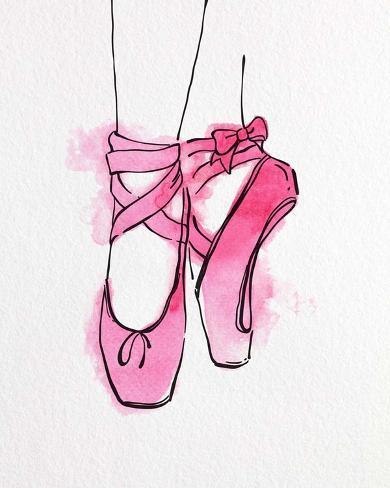 Image mined from this website.
Image mined from this website.I hesitate to call it a hobby since I haven’t been able to do it in years and it was supposed to be my career before life happened, but I’m going to say dancing, especially ballet, has had a profound impact on my writerly mindset. It made me disciplined, persistent, and completely unable to function without music, but it also taught me other, more esoteric lessons.
Choreography is limited by vocabulary. You have to steep yourself in many different styles in order to reach your full potential of artistic expression. You don’t have to like moving your body in a different way than you’re used to, but if you’re serious about this, you have to at least try it.
Pick a song that calls for movements you haven’t mastered yet.
No one will remember a wobbly pirouette so long as you stick the landing.
The most technically challenging move in your arsenal might impress an expert or two. But you can break the heart of anyone watching if you lock eyes with someone in the audience and reach out to them like the music is coming straight from the place where your body and soul connect. Never underestimate the power of a deeply felt articulation of the wrist.
People only want some of their expectations subverted some of the time. Sure, fake them out once or twice to keep their attention, but once the swell of the music demands a leap then leave novelty at the door and leap, damn it.
We all have family recipes. Share one of your favorite ones.
Matt can bake delicious desserts he’s never made before without using a recipe. I’m pretty sure he made a deal with a devil for this talent. But one year, he made the best key lime cake I ever had for my birthday, and he wrote everything down.
 Image mined from this website.
Image mined from this website.This recipe has since been lost. I can never have it again. So instead, as a tribute to the best dessert in the world – a tribute that tastes nothing like the best dessert in the world – you get my mom’s super easy ice cream cake recipe. The hardest part is not eating the ice cream before it softens.
Crust:
two sleeves of Ritz crackers
½ cup of melted butter
Cake:
two 3.5oz boxes of instant vanilla pudding
1 8oz container of Cool Whip
½ gallon of ice cream (Whatever flavor you want. I think mint chocolate chip plays very nicely with the saltiness of the crackers, but I make one with cookie dough too and they both get destroyed. I think coconut would also be fantastic.)
Directions:
Let the ice cream soften overnight. (Or at least 4-6 hours.)Put the ritz crackers in a ziploc baggie and beat the heck out of ‘em. (Matt volunteers for this part. I take the rolling pin away before he turns it into powder.) Combine crumbs and melted butter and press them into a 9×13 pan.Mix together the softened ice cream, pudding mix, and Cool Whip.Pour it into the pan, then put the pan in the freezer. It’ll be ready in an hour or two. Let it thaw for about 15 minutes.
Cry softly between forkfuls that this isn’t a legendary key lime cake.
What’s your favorite food from a country you do not live in?
For both of us, it’s a tie between sushi and chicken tikka masala. We have two all-you-can-eat restaurants near us that do both very, very well, and we can’t wait to gorge ourselves once the plague has passed.
Any final thoughts?
This has been amazing fun, and you gave us such excellent questions. We’re so very thankful to you for giving us a chance to share a bit about ourselves.
Coauthoring suits us so well and we want to do this forever.
Thanks for stopping by, AKM Beach! Remember to stop by their website and buy their books!
November 2, 2020
Indie Author Interview | Clayton Snyder
This is part of a new series of interviews featuring indie authors. These interviews will drop once or twice a week. If you’d like to be part of this series, please contact me at Sarah (at) bookwormblues (dot) net. Please support the authors by clicking on the affiliate links in the interview, spread the word, and, of course, buy their books.
We’re all in this together, you know?
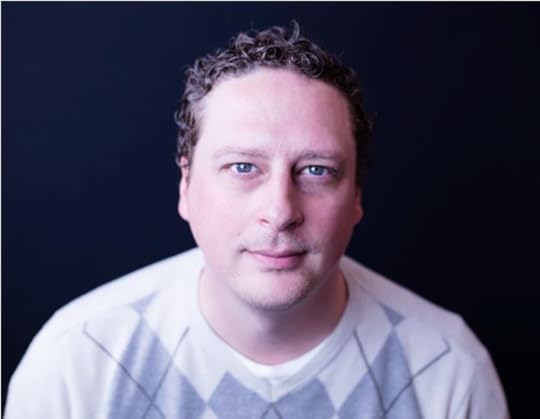
C.W. Snyder is the author of Child of Nod, currently splitting his time between work and writing. He has worked as a system admin, developer, and project manager and authored several short stories, his most recent, “Mother Time, Father Death’, at Helios Quarterly. His literary influences include Roger Zelazny, Stephen King, and Robin Hobb.
Born and raised in Michigan, Clayton is a North Dakota transplant currently living in Bismarck with his wife and two dogs. He participates in several charitable works, including the Brave the Shave event for research for childhood cancer, and the local humane society.
Links
Facebook
Twitter
Website
Amazon
First things first, tell me about your book.
Which one? Let’s go with The Obsidian Psalm. I wanted to write a book about necromancy. There aren’t enough of those. I also wanted to write something that was a mashup of lyrical language, revenge, and horror.

What makes you and your books unique? Shine for me, you diamond.
If you like dark and weird, have I got the severed clown head for you.
What are you working on now/any future projects you want to talk about?
I can’t talk about it! But it’s exciting!
Sarah’s note: I know what this is, and it *is* very exciting.
Let’s celebrate. What’s one of the best things that’s happened to you as an author? Don’t be shy.
At a local con, a man came up and tapped the cover of my book. Said: “I bought your book for my wife last year. She made me come ask you to sign it.”
Let’s talk about CRAFT
If you had to start over with writing and publishing, what would you do differently and why?
I’d slow down. When I started, and until recently, I was so in love with the process, the idea that I could just write something and throw it out there, I was cranking out a short every couple days. Then I wrote a bad novel and tossed it on Amazon. I rushed into my first contract, and that company fell over and sank into the swamp. I pumped out a bunch of books in six short years. My Goodreads page is littered with nearly a decade of poor decisions I wish I could go back and slap my younger self.
Do you listen to music when you write? What kind?
Rock, mostly. Southern rock, specifically. Some blues. Vintage Trouble, BB King, Robert Johnson, Robert Cray, Gov’t Mule, The Stone Foxes, Rival Sons, Black Stone Cherry, Black Rebel Motorcycle Club, The Record Company, Glorious Sons, etc, etc. For whatever reason, anything blues-based just really fuels my brain.
What are some of the most interesting rabbit holes you’ve found yourself lost down?
I once fell down a hole of theoretical/obscure Russian currency and landed on the Koyln, the exchange rate of which was 1 = 10lbs of potatoes, and 2 = 1 dozen eggs.
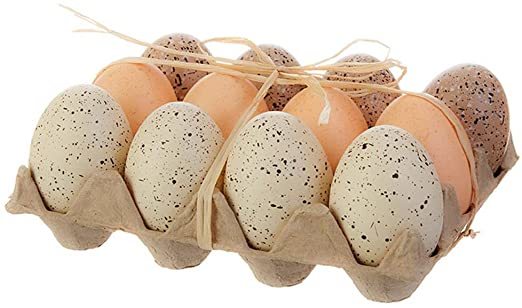
When does research matter, and how do you incorporate it into your books?
I write a lot of… gory subject matter. Grey’s Anatomy has been a godsend. If there’s someone being cut to pieces, or bleeding out in an interesting way, it’s because of that book.
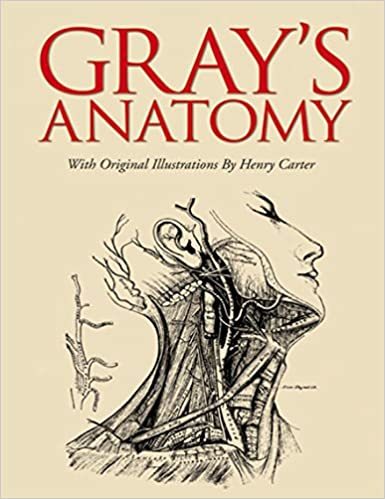
All about BOOKS

What’s your bookish guilty pleasure?
I love noir. Stupid, dark, violent noir. I know it’s a bit old-fashioned and cliche, but anything with a troubled detective, snark, and a mystery, I’m on board for.
Let’s throw some light on diversity. What are some books you love that feature diverse characters, diverse authors, etc.
Anna Smith Spark’s Empires of Dust (written by a non-neurotypical author). RJ Barker’s Wounded Kingdom, featuring a disabled assassin relying on wits over physical prowess. Victor Lavalle’s The Ballad of Black Tom kicks Lovecraft in the teeth. Tade Thompson’s Rosewater, an alien invasion story like no other. Daniel Jose Older’s Half-Resurrection Blues, urban fantasy with a literary bent.
Hobbies & All Things WEIRD
When you aren’t writing, what can you typically be found doing?
Gaming, for the most part. Board, video, TCG. I’m not super picky. Right now I’ve been dipping in and out of MTG: Arena, which, aside from deck-building, I find I can dip in and out of, which works great with my schedule.
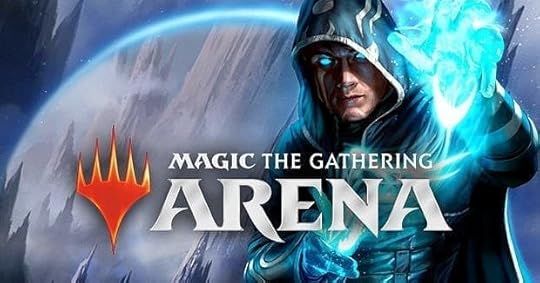
What’s something you’re terrible at, but you love doing it anyway?
Playing music. Over the years, I’ve played trombone, sax, drums, piano, and guitar. I universally suck at them all. But it’s interesting and relaxing, and even if I’m not good, I love it.
What’s your favorite food from a country you do not live in?
TimTams! Brave, I know. But they’re addictive. Like chocolate crack.

If you were a weapon, what weapon would you be and why?
Some sort of a stick that smacks its user in the face on a constant basis.
Any last thoughts?
Don’t trust anyone wearing Zubaz.
Thanks for stopping by, Clayton! Stop by his website and remember to buy his books!
October 30, 2020
Indie Author Interview | A.M. Justice
This is part of a new series of interviews featuring indie authors. These interviews will drop once or twice a week. If you’d like to be part of this series, please contact me at Sarah (at) bookwormblues (dot) net. Please support the authors by clicking on the affiliate links in the interview, spread the word, and, of course, buy their books.
We’re all in this together, you know?

Brooklyn-based author, lover of science and wit, sporadic scuba diver, and once and future tango dancer. Her characters live only in her head, but they’re real, and she puts them through hell.
Winner, First Place, Science Fiction/Fantasy, 2016 Writers Digest Popular Fiction Awards
Finalist, Science Fiction, 2017 Next Generation Indie Book Awards
Honorable Mention, 2017 Reader’s Favorite Book Awards
Links
Website
Twitter
Facebook
Goodreads
If you sign up for my newsletter on my website, you’ll receive a free Woern Saga short story entitled “Kill Squad” and a code you can use to buy signed copies of my books for half off the cover price plus shipping.
All right, tell me about your book.
The Woern Saga is about a young woman named Vic (short for Victoria) who happens to have the same name as a hero who slew an evil wizard a thousand years earlier. The first book, A Wizard’s Forge, follows Vic on a journey through some harrowing travails before she finds the power to defeat her nemesis. In the second book, A Wizard’s Sacrifice, Vic discovers the true implications of her newly acquired powers as well as her connection to her historical namesake.
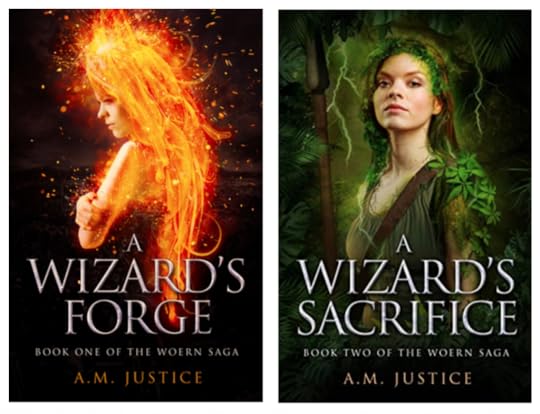
What makes you and your books unique? Shine for me, you diamond.
As I mentioned above, the series is set on a lost space colony, and one of the sources of tension is that Vic is an atheist from a culture that preserved and revered knowledge of humanity’s off-planet origins, whereas most people on her world worship the abandoned hulk of the spacecraft (which appears as a bright, fast-moving “star”) as a god. I use the setting and Vic’s predicaments to explore a lot of psychological and social themes, including abuse, trauma bonding, PTSD, religious faith, filial and romantic love, revenge and redemption, environmentalism, and class conflict. Readers who pay close attention to the subtext will also recognize that The Woern Saga is a crazy, mixed up (and largely subconscious) retelling of “Rapunzel.”
What are you working on now/any future projects you want to talk about?
There’s a third Woern Saga novel in the works, although it will be a more or less stand alone, set 20 years after the end of A Wizard’s Sacrifice. I am also mulling over expanding “Remains of the Spell,” a short story about the housekeeper to a sorceress, into a novel. It would be sort of Downton Abbey meets Game of Thrones.
Let’s celebrate. What’s one of the best things that’s happened to you as an author? Don’t be shy.
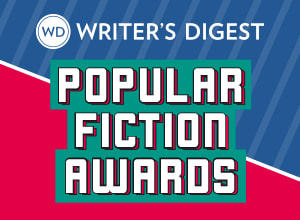
One of the most exciting things to happen was getting the email from Writers Digest saying my short story “The Weight of Bliss” (also set in the world of the Woern Saga) had won first place in the science fiction category of their Popular Fiction Awards. The prize was a substantial check that’s the biggest single payment I’ve received for my fiction. A Wizard’s Forge also won some honors, which made me feel like I’d done a thing or two right with that book.
Let’s talk CRAFT
How do you build your world/characters? What does your process of creation look like?
I start every story I write with a character—including stories I’ve written—in response to prompts or to fit predefined specifications. Once I come up with a person and an immediate dilemma (or sometimes they come up to me), I just follow them around and see what happens to them and what they do in response. The worldbuilding comes on a need to know basis—both the action and the world develop around the character as they go about their business. As you may surmise, I’m a total pantser, which poses problems when you’re trying to write a story that makes sense and that flows and ebbs in the right way to maintain drama and tension. This means, I revise a lot. A short story typically will go through at least three drafts. A novel even more.
Let’s talk about diversity. How do you incorporate realistic diversity into your books? (Sensitivity readers, research, etc.) And why is it important to you?

Ursula K. Le Guin is my literary idol and an author who shaped not only my creative thinking but my worldview. I grew up in the 1970s in white suburban neighborhoods, and except for the biracial girl who lived down the street when I was in kindergarten, I not only didn’t have any friends of color, I didn’t know any people of color. Le Guin changed that for me, by introducing me to Ged and Genly Ai, and a host of other protagonists from her work. She taught me about representation and that a hero’s complexion didn’t have to be white. She also taught me the limits of tokenism. As a Gen-Xer, I remember how excited everyone was when Billy Dee Williams joined the cast of Star Wars, yet even back then I thought it was stupid—and implausible—that there would be a single black person in the entire universe. The legacy of that token casting echoed down through the decades, when all those fanboys got their panties in a twist over the number of women and people of color that suddenly were populating the galaxy far, far away.
Because I grew up on not only Le Guin’s work but the ideals of Star Trek, where racism and sexism have been eliminated (we’re told—by today’s standards, the older Star Trek series are rife with tokenism and appalling sexism), I felt it was vitally important to create this world without racism—and with gender parity—as an aspirational model of what could be. I also write fantasy firmly rooted in science fiction, where the setting is a lost space colony, and as I built my world, I thought quite a bit about what the descendants of the marooned spacefarers would look like. If you start with a seed population inclusive of all the world’s phenotypes (that is, people’s physical characteristics), after a few dozen generations, most people would have tan or brown complexions and black or brown hair, although other skin tones and hair types would remain in the population at lower frequencies. Meanwhile, notions of race don’t exist on my world because not only has there been this great mixing of genetic traits but there have also been thousands of years of cultural evolution that has left most of the world’s human occupants ignorant of their Earth origins and thus disconnected from the historical and cultural contexts underlying racial biases. Of course, humans are humans, and they’ll find other ways and reasons to be awful to each other, and they manage that just fine in my work.
What’s the weirdest thing you’ve researched while writing a book?
The magic in my world is a side effect of infection with a neurologic parasite called the Woern. It works a little like the midichlorians of Star Wars (side note: I came up with the concept for the Woern totally independently), in that people who have the Woern, and survive, are gifted with telekinetic powers. I set up the Woern to be transmitted through bodily fluids like herpes virus and HIV, although their negative systemic effects are a little closer to Lyme spirochetes, and I looked into all of those diseases and how they’re transmitted when I was nailing down the specifics.
What does your research process look like?
I make my living as a medical writer, and my research process for both my clinical and my fiction writing is pretty similar: I look stuff up when I need to put it into the paper/story. I do it this way primarily because I retain information best when I’m writing, not when I’m reading. At the same time, because my interests range widely, I am pretty widely read and I know how to read critically. As for sources, again for both tasks, I usually start with Google. (Thank the tech gods for Google! While there’s a part of me that misses going to libraries and sorting through card catalogues and chasing things down in book after book, that’s a very small part. Lazy me is certainly happy to sit at my desk and browse through Google links.) Anyhow, I start with Google and overview sites like Wikipedia. I’ve learned from my medical writing career though, that broad sources like that are fine to start with, but to really get to the core of something—and verify the facts—you have to look at the original source materials cited in the overview.
All things BOOKISH
Tell me about an underappreciated book, and why everyone should read it.

My favorite book no one has heard of is The Ill-Kept Oath by CC Aune. Full disclosure: I am friends with and beta read for the author. Nevertheless, I wholeheartedly and without bias (truly!) will shout this recommendation from your rooftop. The first time I read it, it was one of those novels that pin you to your seat and have you growling at people and pets to leave you alone because you just want to continue living in that world rather than your own. The story is set in England in the early 1800s and follows a pair of cousins as they try to be good gentlewomen and make good marriage matches, but instead find out they’re heirs to magical powers and that there’s a budding insurgency of mages who want to overthrow the Crown. It’s a great story of young women realizing their own potential and starting to break out of the confines of society. Aune writes in authentic, Austen-esque language that is succinct and elegant and conveys much with few words. Reading her prose sends shivers down my spine.
Tell me about your To Be Read pile. What’s on it? What should be on mine?
Well, I’m in my second year as a judge on the Fantasy Faction team for the SPFBO (Self-Published Fantasy Blog Off)—something you know a thing or two about. I won’t talk about the Fantasy Faction batch (as of my writing this, we haven’t yet announced any semi-finalists or the finalist), but there are quite a few titles in other groups that have caught my eye, including Timberwolf by Dominic Adler and The Nothing Within by Andy Giesler. Of classic fantasy, Tigana by Guy Gavriel Kay waits on my Kindle. Kay is one of my favorite authors, and I’m a little ashamed that I’ve never read his best-known novel, so I need to get on that one. I also feel like I’m missing out that I haven’t yet read a single book by NK Jemisin.
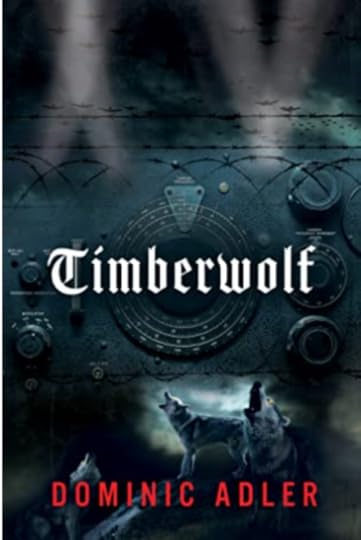
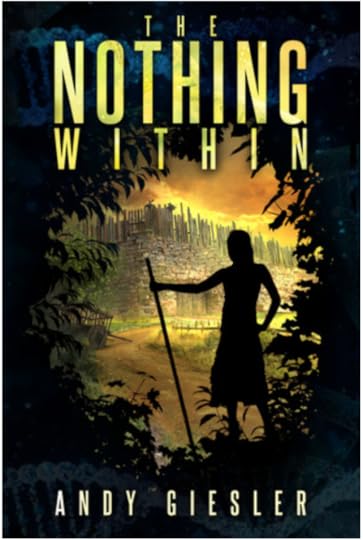
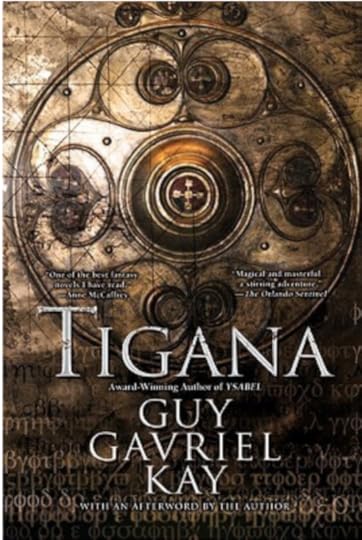
Hobbies & All Things WEIRD
How do your non-writerly hobbies influence your writing?
My two favorite nonsedentary activities are scuba diving and dancing, and both have made it into my work. Readers of A Wizard’s Forge will recall there’s a ballet in the middle of the book, but there’s also an underwater scene near the end that was inspired by some of my diving experiences. There are more underwater scenes and a tango in the next Woern Saga novel, although that book is in such flux I’m not sure if any of those will make it into the final story.
What’s a hobby you had as a child that you no longer do?
When I was a kid and a teen, I wanted nothing more than to be an actress or a marine biologist, and probably the ultimate ambition was to be a marine biologist with a TV show, like an American Jacques Cousteau. (When I was 11 years old, I wanted to marry Phillipe Cousteau, Sr—I didn’t care that he was old enough to be my father and already married. Now I’m married myself and too old for Phillipe Cousteau, Jr, but I still think he’s as smokin’ hot as his dad!) As a child, I read every book on ocean life I could get my hands on. Most of that knowledge slipped out of the sieve of my brain a while back, but when I do have the chance to go diving, I will happily spend hours perusing our fish identification books to figure out what I’d seen underwater.
As much as I loved (and still love) the ocean, I adored being on stage when I was young. I’m very shy and hate talking to people de novo, but give me a script or even a loose outline of something to talk about, and I will elbow my way to the spotlight. It’s a way of interacting with people without that fear that you’ll be incredibly boring, because what you’re supposed to say is already prescribed. However, I quit acting after being fired from a college production a week before opening night, because the director didn’t feel my performance was good enough (yeah, ouch). It was a devastating experience, but it also crystallized my will to write. Theater training has also been good for storycraft because it helps me inhabit and flesh out my characters so they’re as real as they possibly can be. And I still find ways to be in the spotlight as much as I can. When I still worked in the corporate world, I loved doing new business pitches, because that’s a sort of performance. Nowadays, I’m thrilled when I get asked to moderate or serve on panels for SFF cons. (Yoohoo, con organizers, over here! )
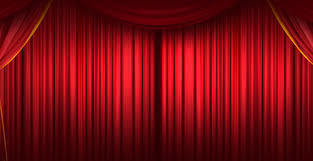
What’s your favorite holiday and why?
I love Thanksgiving. I didn’t when I was a kid, because I used to hate all Thanksgiving food. Somewhere along life’s journey, however, I acquired a taste for it, especially once I learned to make my own cranberry sauce and met people who knew how to cook turkey. I also adore my husband’s family, and we always have a great time together on Thanksgiving. It is a very joyous, Norman Rockwell–ideal experience celebrating holidays with them, but Thanksgiving is particularly special because it’s not about anything but being with your loved ones and showing gratitude for life’s blessings.
We all have family recipes. Share one of your favorite ones.
My family loves a type of tuna salad sandwich we call “tuna burgers” because I usually serve them on a whole wheat hamburger bun, although they’re also great on sandwich thins or brioche. Instead of mayonnaise, I use guacamole as the dressing. Because I read that you, Sarah, don’t like tomatoes, here’s a version with mango guacamole.
Mango Salsa
Note that measurements are approximate and should be adjusted to one’s taste. Two medium tomatoes can be substituted for the mango.
1 large(ish) ripe mango, diced
¼ fresh red onion, finely chopped
2 small to medium tomatillos, finely diced
1/3 cup fresh cilantro, finely chopped
½ teaspoon Vietnamese chili garlic sauce (optional)
1/8 teaspoon Kosher salt
Juice of 1 lime
(If using tomatoes instead of mango, add ¼ teaspoon sugar.)
Mix all ingredients together and set aside for at least 15 minutes.
Guacamole
1 ripe avocado
2 tablespoons of above salsa
Pinch of Kosher salt
Slice avocado in half and remove pit (be careful if using the French knife method—don’t hack your hand off [I know someone who required surgery for an avocado-pitting injury]!). Scoop out meat and mix with salsa. Set aside.
Tuna Burger Filling
1 5-oz can of sustainably harvested, dolphin safe tuna (remember, ocean-lover here)
2 tablespoons guacamole
Mix together. Use more guacamole for a moister tuna salad. Serve with American cheese slices on buns and broccoli, salad, and/or tortilla chips on the side. Serve remaining salsa and guacamole as dressing for chips and/or veggies.
Serves 3
Any final thoughts?
Just a huge thank you for letting me come here and gab about myself!
Thanks for stopping by, A.M. Justice! Check out her website and remember to buy her books!
October 29, 2020
Indie Author Interview | Rob J. Hayes
This is part of a new series of interviews featuring indie authors. These interviews will drop once or twice a week. If you’d like to be part of this series, please contact me at Sarah (at) bookwormblues (dot) net. Please support the authors by clicking on the affiliate links in the interview, spread the word, and, of course, buy their books.
We’re all in this together, you know?
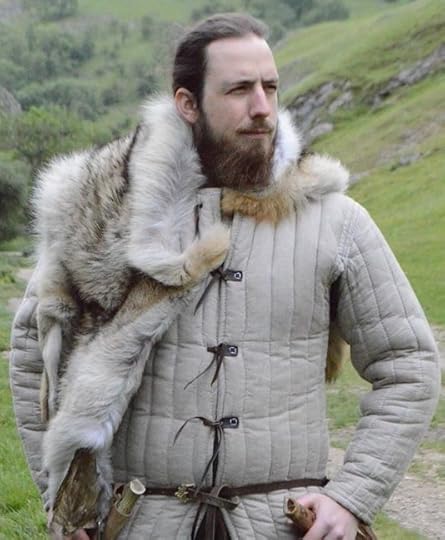
Rob J. Hayes has been a student, a banker, a marine research assistant, a chef, and a keyboard monkey more times than he cares to count. But eventually his love of fantasy and reading drew him to the life of a writer. He’s the author of the Amazon Best Selling The Heresy Within, the SPFBO-winning piratical swashbuckler Where Loyalties Lie, and the critically acclaimed Never Die.
Links
Website
Facebook
Twitter
Patreon
Let’s start out with this. Tell me about your book.
Which one? I’m ramping up to start talking about Pawn’s Gambit soon, so we’ll go with that one. Pawn’s Gambit is the sequel that’s not a sequel to Never Die. It’s the 2nd book set in the Mortal Techniques world, but is a complete stand alone. You don’t need to have read book 1.
As for what it’s about. Well, it’s about a famed and disgraced strategist who is recruited by the God of Missed Opportunities to help overthrow the Emperor of Heaven. It’s kinda like a big old mashup of Clash of the Titans and Journey to the West.
And it’s coming January 26th 2021.
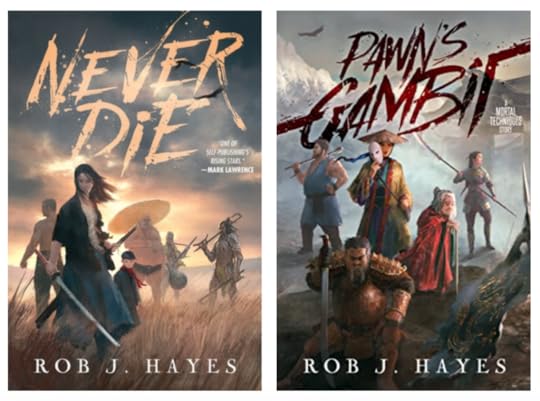
What makes you and your books unique? Shine for me, you diamond.
Run on sentences. Sentence fragments. Comma splices. You know, all those things you’re not supposed to do.
On a serious note. I think I’m pretty good at creating unique characters who are strong (if not always likeable) and compelling.
What are you working on now/any future projects you want to talk about?
So along with my next release being Pawn’s Gambit, I am currently working on the 3rd Mortal Techniques novel which I also hoping to release in 2021. I’ve also got a flintlock military/horror fantasy called Guns of the Twelfth. And the follow up to The War Eternal is on the drawing board too. So many many books.
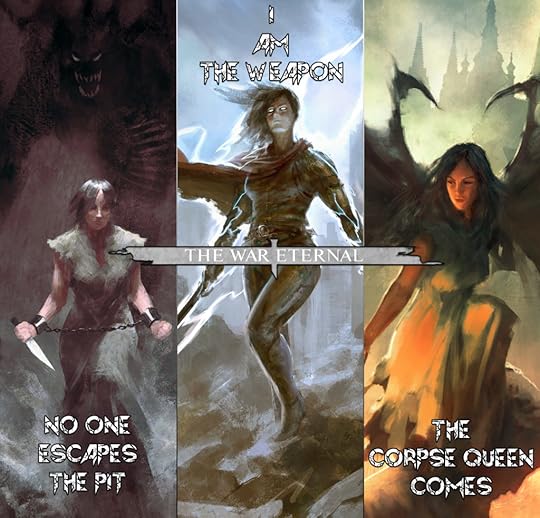
Let’s celebrate. What’s one of the best things that’s happened to you as an author? Don’t be shy.
My mother read my books and didn’t hate them.
Also, I guess I won a sword last year. That was cool!
Award: Booknest Award for Best Self Published 2019
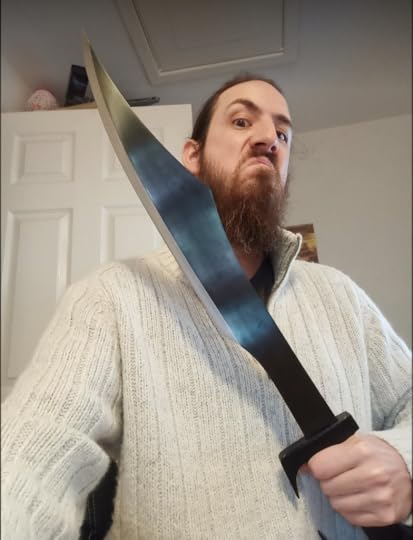
Let’s talk about CRAFT
What does your writing space look like?
I have a really tiny office made even smaller by piles and piles of boxes. Because of all that clutter, I’ve included only two pictures. One is my desk which can be converted from sitting to standing depending on how lazy I’m feeling. It’s usually got a cup of tea sitting on the coaster because I consume tea at wild pace. It’s also covered in notes from the books I’m working on.
The other photo is my bookshelves which are desk adjacent so I have hundreds of books close at hand to make me feel like a proper author. Also pop dolls… and booze.
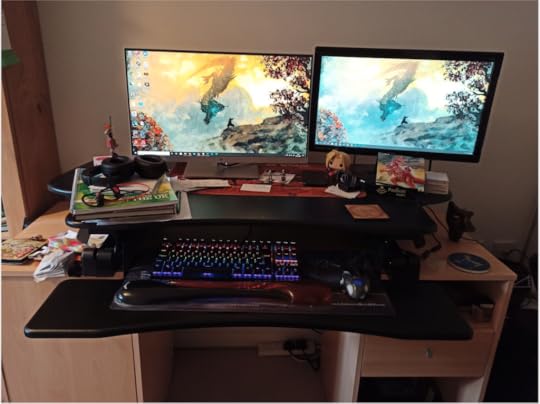
How do you build your world/character? What does your process of creation look like?
Also…
Plotter or Pantser? And why?
I’m calling these two questions one… for me at least. I have an absolute Pantser of the highest order. I rarely know much about the world or characters or plot before I sit down and start writing. So I usually start with an idea.

What if I wrote a story set in an Asian influenced world about heroes and shinigami and a young kid who can bring dead heroes back to fight for him?
This was honestly about all I really had when I sat down to write Never Die. Well, this and a bunch of cool-sounding hero names. The book just kinda flowed out of me, the world and characters building themselves as I went. It wasn’t until about 40% through that one that I figured out what it was about and had a vague idea of how it was going to end. And that’s pretty much how I work. I’m discovering the world as I’m creating it.
It’s obviously a little bit different with sequels and the like. Then I’m constantly referring back to the notes I made while writing book 1. Trying to make sure it all fits and remembering what eye colour everyone has. I am awful with remembering eye colour.
What’s the weirdest thing you’ve researched while writing a book?
Well recently I ended up searching for how long a human corpse takes to cool down. That was an odd one. Apparently there are a lot of variables.
I’ve been doing a lot of research on Japanese Yokai (vengeful spirits) lately for the 3rd Mortal Techniques book. That could definitely class as weird. There are some really odd ones. Like a haunted stirrup of an officer’s horse. Or little spirits that drink the oil out of lanterns.
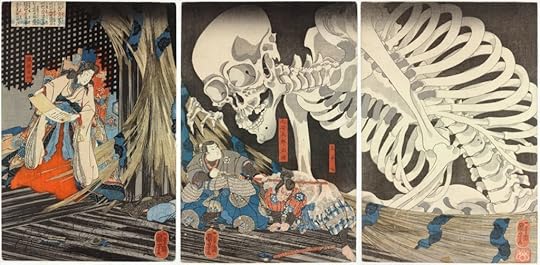
What research tips or tricks would you give another writer?
Figure out how you want your writing to be beforehand. What I mean by that is decide whether you want to go hard on the historical accuracy or if you’re happy to take some poetic lisence. For me, I tend to research a whole variety of subjects for the books I’m writing, but I’m also willing to ditch certain things if need be. I go for drama over rigid accuracy. But that’s just me. Other people are not willing to sacrifice the accuracy and that’s fine as well. So figure out your style and how you want to portray things before you start the research.
All Things BOOKISH
Tell me about your To Be Read pile. What’s on it? What should be on mine?
If you check out the picture of my bookshelves, the second shelf up on both shelves is my TBR. And that’s just physical books. I dare not look at my Kindle and I have a good 5 or 6 audiobooks lined up as well. You might notice I even have one of your books on the old TBR, Sarah. It’s got a whole range of trad and self pubbed books, whole series and series starters, stand alones. I’ve got fantasy and sci-fi and… other. Some have even been on the TBR for many years now. Too many books and yet also never enough.
As for what should be on your TBR. Anything and everything. But mostly, anything by Chris Wooding, Robin Hobb, or Mark Lawrence. From my experience you cannot go wrong with any of those three.
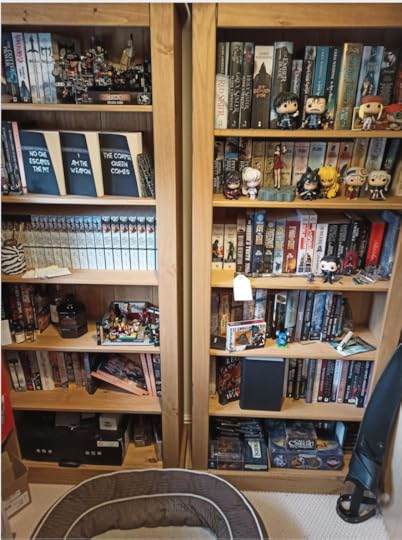
Let’s throw some light on diversity. What are some books your love that feature diverse characters, diverse authors, etc.
So straight off the bat I would say Sword of Kaigen by ML Wang. It’s an absolute heart-wrenching book that will make you fall in love and hate and grieve and cheer. The sheer emotion packed into it and the way that emotion is delivered is so amazing and so real.
Jade City by Fonda Lee is another one I have been reading recently and loved. Both that and the sequel Jade War are outstanding. The characters feel so real and their issues, their strengths and weakness and flaws are there on display in a way that just connects you to them.
Rage of Dragons by Evan Winter. The book isn’t on my shelf because I listened to the audio (which was fantastic). It’s the start of a new epic fantasy that is clearly massive in scope and features an African-inspired world that is complex and woven so well into the story.
Gideon the Ninth and the sequel Harrow the Ninth by Tamsyn Muir. Again I listened to these ones. I loved the sheer amount of character that is woven into the voice of these books. So much snark! It was an absolute joy to be carried along with the wit and mystery. Also, it’s tagged as Lesbian Necromancers in Space. How can you not want to read that?
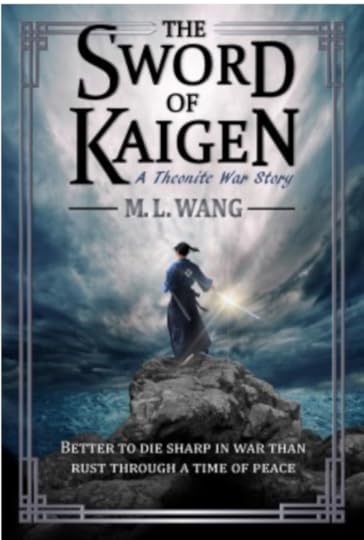
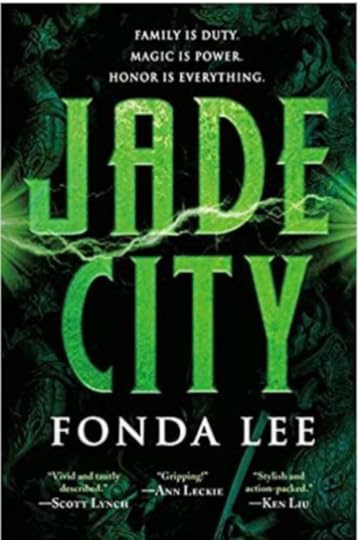
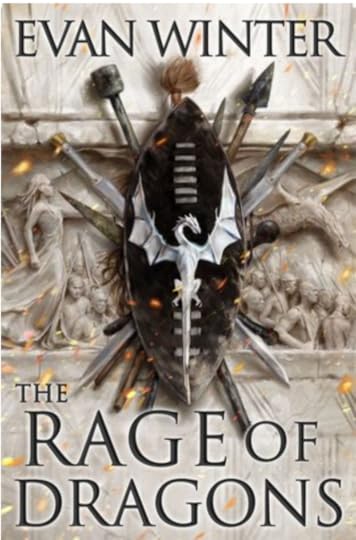
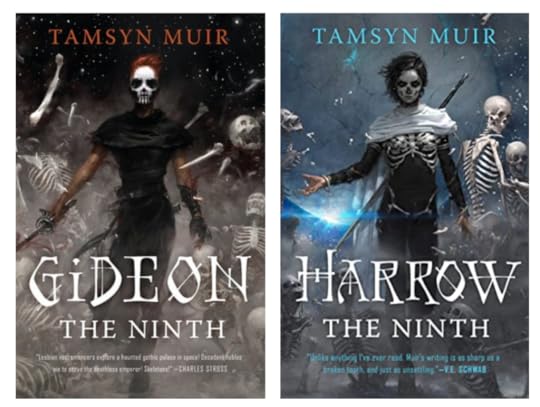
Hobbies & All Things WEIRD
What’s something you want to learn how to do? Why?
I would love to learn another language. Or two. Or five. I don’t really seem to have the brain for it and I really struggle to learn more than a few words, but I love that there are so many languages in the world. It’s honestly real life magic to me that people can speak multiple languages and can communicate across that divide.
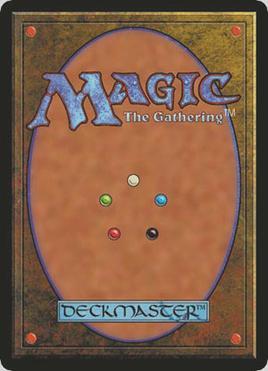
How have your non-writerly hobbies influenced your writing?
So I’m a massive fan of card gaming. Things like Magic the Gathering, Arkham Horror (you can see my collection on the bookshelf picture). All sorts. I’ve played many. And recently I came up with an entirely magic system based not on any one card game, but on card gaming itself. It’s really cool and varied and bizarre. Hopefully I’ll get to talk about that more next year. 



